New York Public Library copy
1669 Coppy of the Fundamental Constitutions
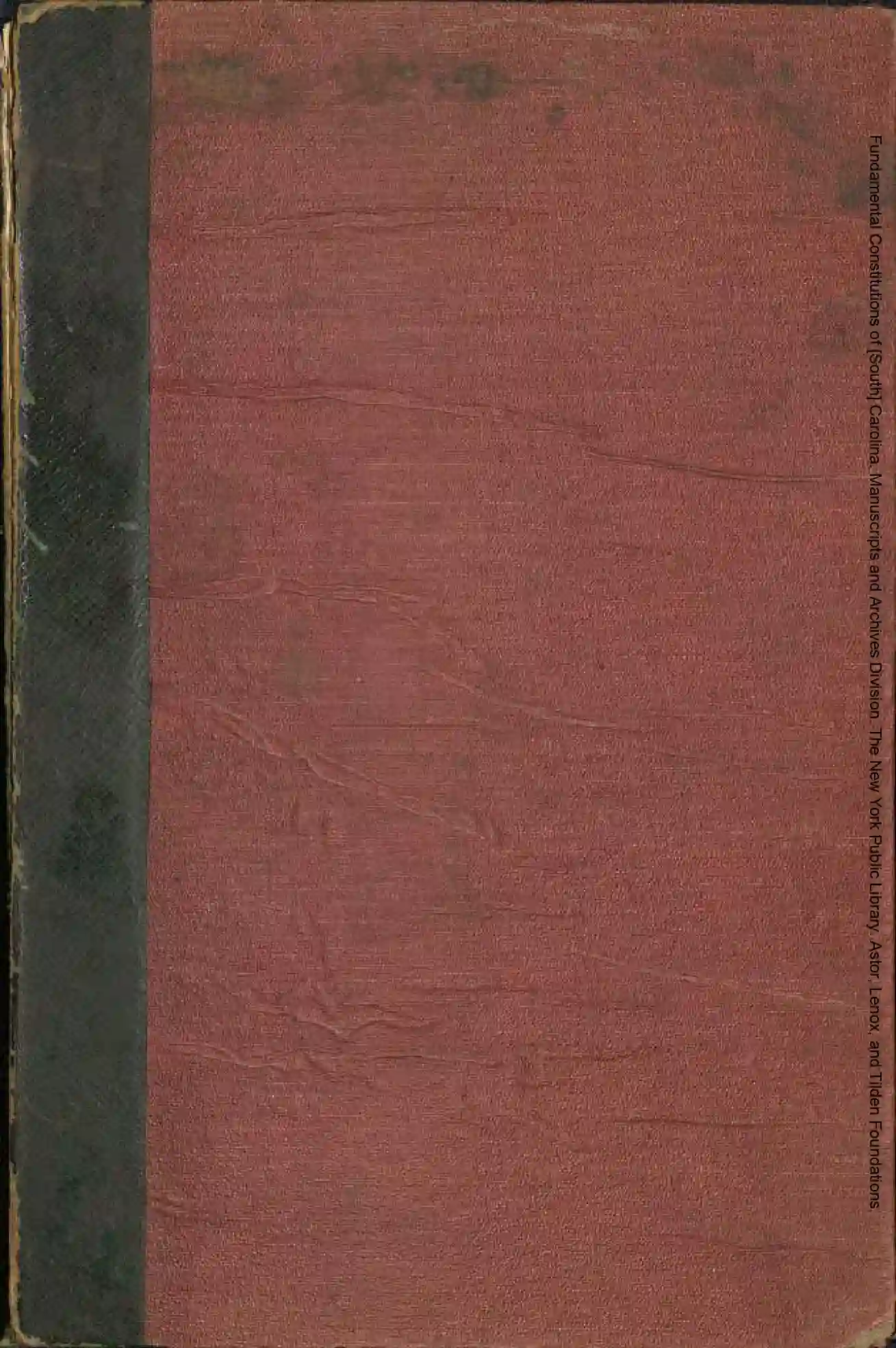
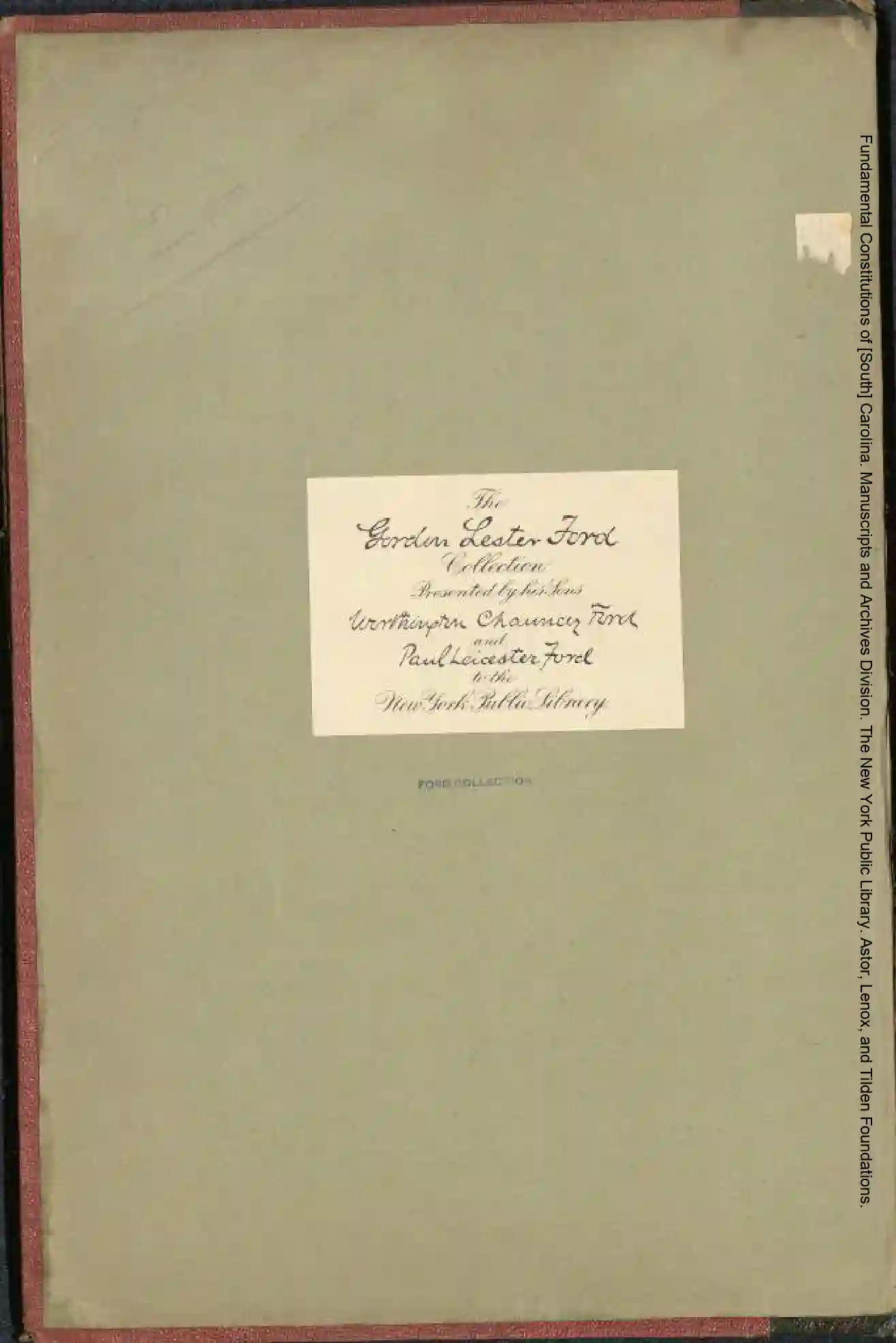
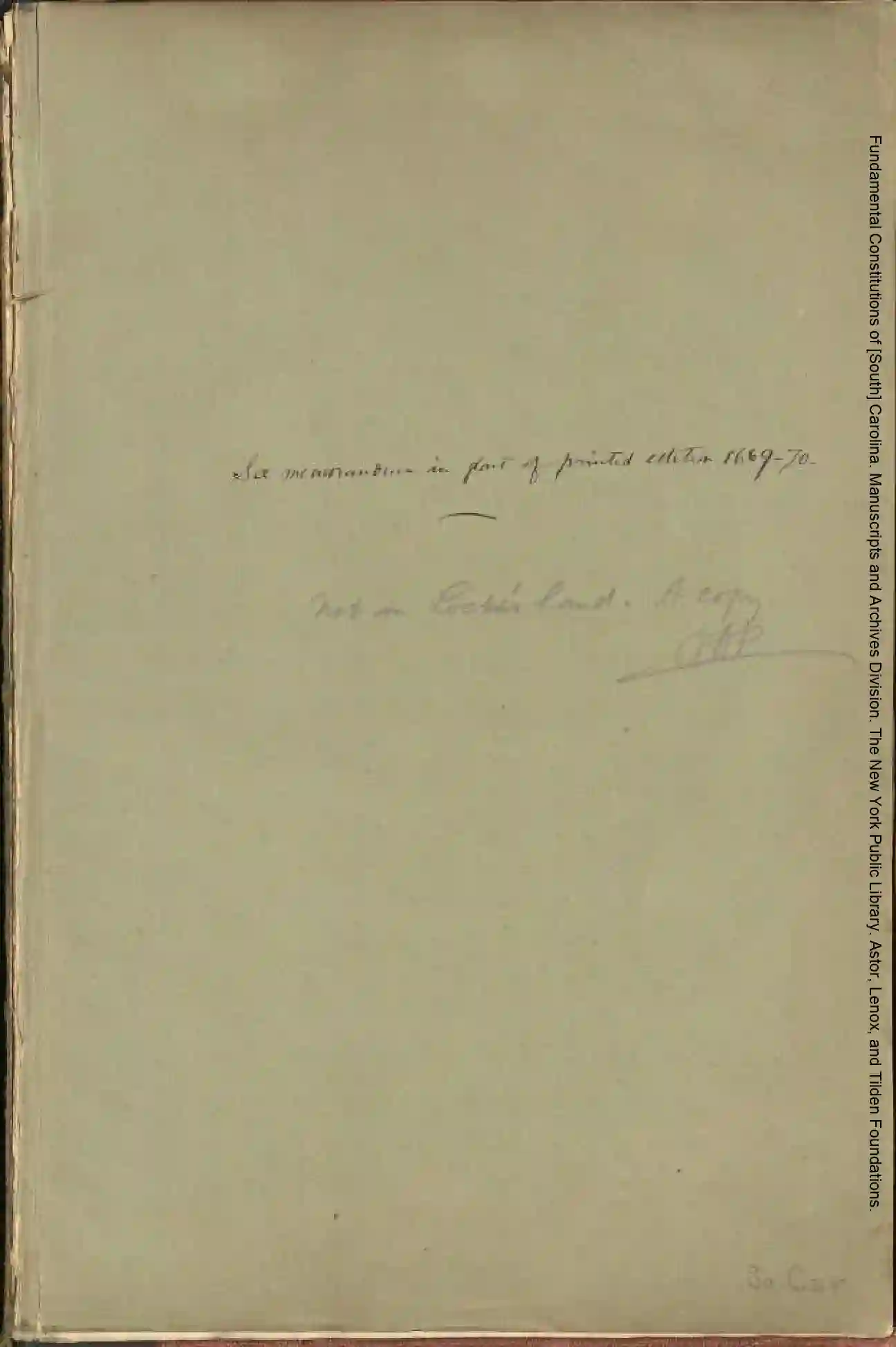
See memorandum in front of printed edition 1669-70.
Not in Locke’s hand. A copy.
[?]
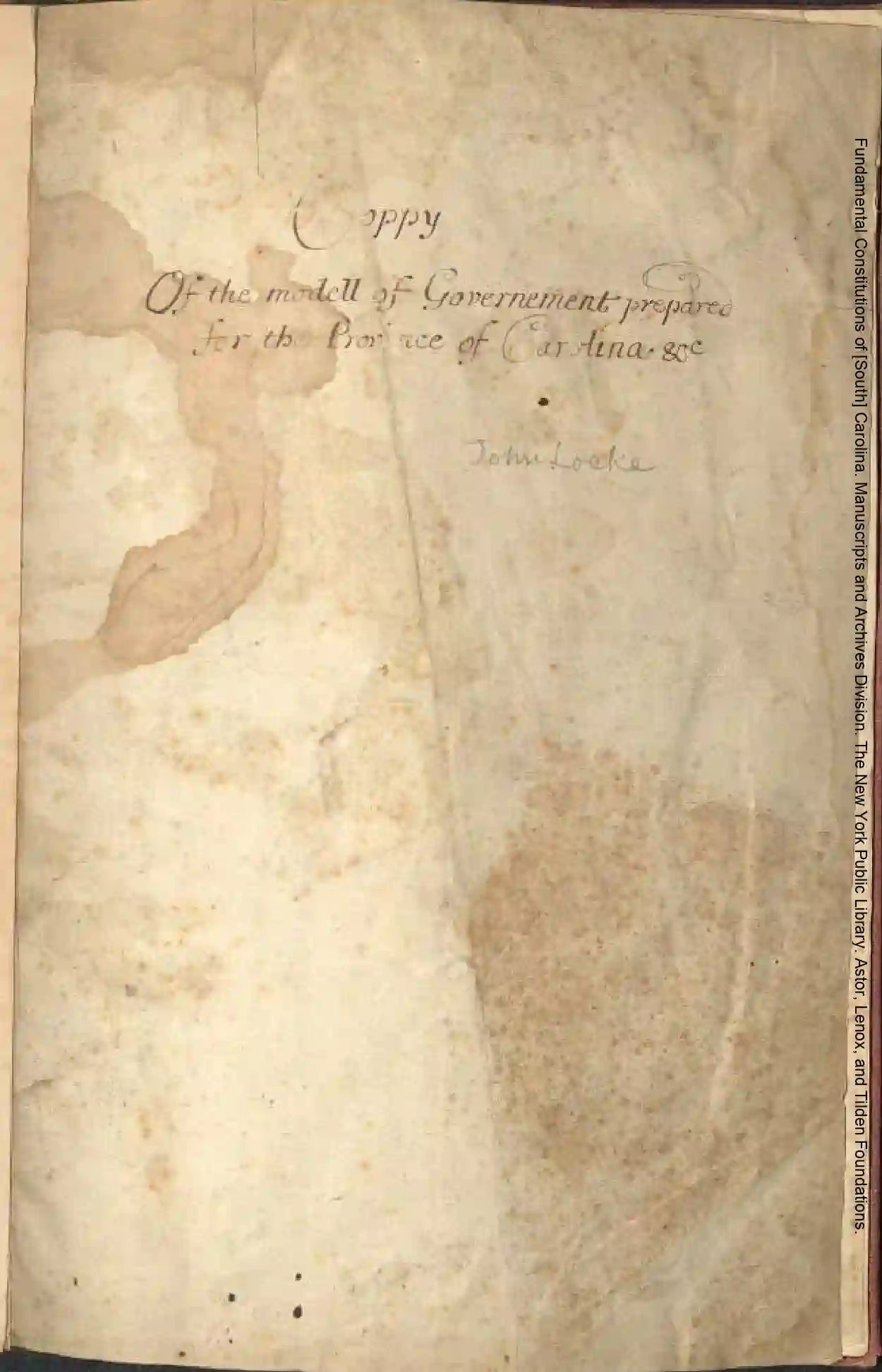
Coppy
Of the modell of Governement prepared
for the Province of Carolina &c
John Locke
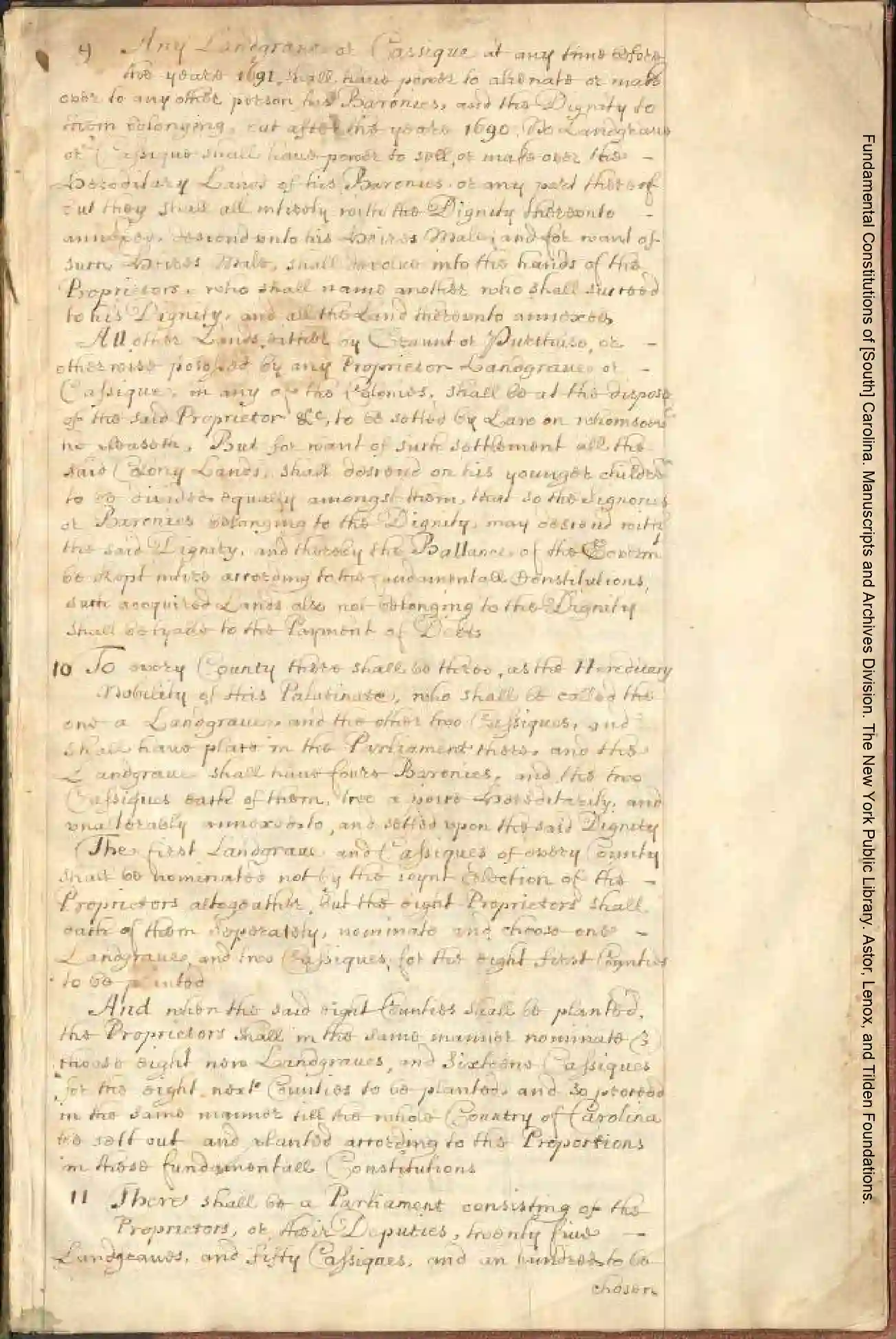
9 Any Landgrave or Cassique at any time before
the yeare 1691, shall have power to alienate or make
over to any other person, his Barronies, and the Dignity to
them belonging, but after the yeare 1690, No Landgrave
or Cassique shall have power to sell, or make over the
hereditary Lands of his Baronies, or any part thereof
but they shall all intirely with the Dignity thereunto
annexed, descend unto his heires Males and for want of
such heires Male, shall devolve into the hands of the
Proprietors, who shall name another who shall succeed
to his Dignity, and all the Land thereunto annexed.
All other Lands, either by Graunt or Purchase, or
otherwise posessed by any Proprietor Landgrave or
Cassique, in any of the Colonies, shall be at the dispose
of the said Proprietor &c, to be setled by Law on whomsoever
he pleaseth, But for want of such settlement all the
said Colony Lands, shall descend on his younger children
to be divided equally amongst them, that so the Signories
or Baronies belonging to the Dignity, may descend with
the said Dignity, and thereby the Ballance of the Government
be kept intire according to the fundamentall Constitutions,
such acquired Lands also not belonging to the Dignity
shall be lyable to the Payment of Debts.
10 To every County there shall be three, as the Hereditary
Nobility of this Palatinate, who shall be called the
one a Landgrave, and the other two Cassiques, and
shall have place in the Parliament there, and the
Landgrave shall have foure Baronies, and the two
Cassiques each of them, two a [paire] hereditarily; and
unalterably annexed to, and setled upon the said Dignity
The first Landgrave and Cassiques of every County
shall be nominated not by the joynt Election of the
Proprietors altogeather, but the eight Proprietors shall
each of them seperately, nominate and choose one
Landgrave and two Cassiques, for the eight first Counties
to be planted
And when the said eight Counties shall be planted,
the Proprietors shall in the same manner nominate &
choose eight new Landgraves, and Sixteene Cassiques
for the eight next Counties to be planted, and so proceed
in the same manner till the whole Country of Carolina
be sett out and planted according to the Proportions
in these fundamentall Constitutions.
11 There shall be a Parliament consisting of the
Proprietors, or their Deputies, twenty five
Landgraves, and fifty Cassiques, and an hundred to be
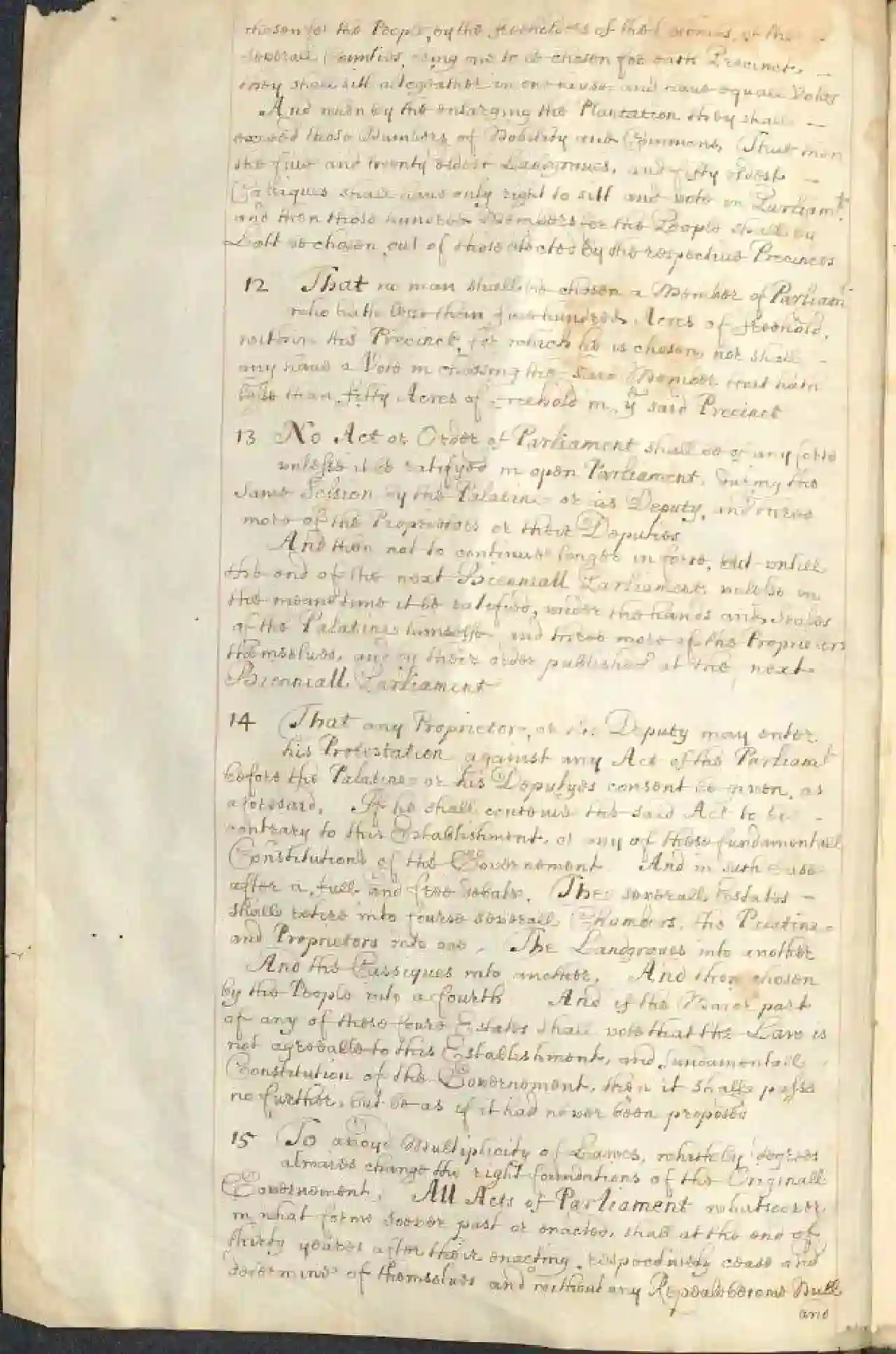
chosen for the People, by the freeholders of the Colonies, of the
severall Counties, being one to be chosen for each Precinct,
they shall sitt altogeather in one house, and have equall Votes
And when by the enlarging the Plantation they shall
exceed those Numbers of Nobility and Commons, That then
the five and twenty eldest Landgraves, and fifty eldest
Cassiques shall have only right to sitt and vote in Parliament,
and then those hundred Members for the People shall by
Lott be chosen, out of those elected by the respective Precincts
12 That no man shall be chosen a Member of Parliament
who hath lesse than five hundred Acres of freehold,
within the Precinct, for which he is chosen, nor shall
any have a Vote in choosing the said Member that hath
lesse than fifty Acres of freehold in the said Precinct
13 No Act or Order of Parliament shall be of any force
unlesse it be ratifyed in open Parliament, during the
same Session by the Palatine or his Deputy, and three
more of the Proprietors or theire Deputies
And then not to continue longer in force, but untill
the end of the next Bienniall Parliament, unlesse in
the meane time it be ratified, under the hands and Seales
of the Palatine himselfe, and three more of the Proprietors
themselves, and by their order published at the next
Bienniall Parliament
14 That any Proprietor, or his Deputy may enter
his Protestation against any Act of the Parliament
before the Palatine or his Deputyes consent be given, as
aforesaid, If he shall [conceive] the said Act to be
contrary to this Establishment, or any of these fundamentall
Constitutions of the Governement. And in such Case
after a full and free debate, The severall Estates
shall retire into fourre severall Chambers, the Palatine
and Proprietors into one, The Landgraves into another
And the Cassiques into another, And those chosen
by the People into a fourth. And if the Major part
of any of these foure Estates shall vote that the Law is
not agreeable to this Establishment, and fundamentall
Constitution of the Governement, then it shall passe
no further, but be as if it had never been proposed
15 To avoyd Multiplicity of Lawes, which by degrees
alwaies change the right foundations of the Originall
Governement, All Acts of Parliament whatsoever
in what forme soever past or enacted, shall at the end of
thirty yeares after their enacting, respectively cease and
determine of themselves and without any Repeale become Null
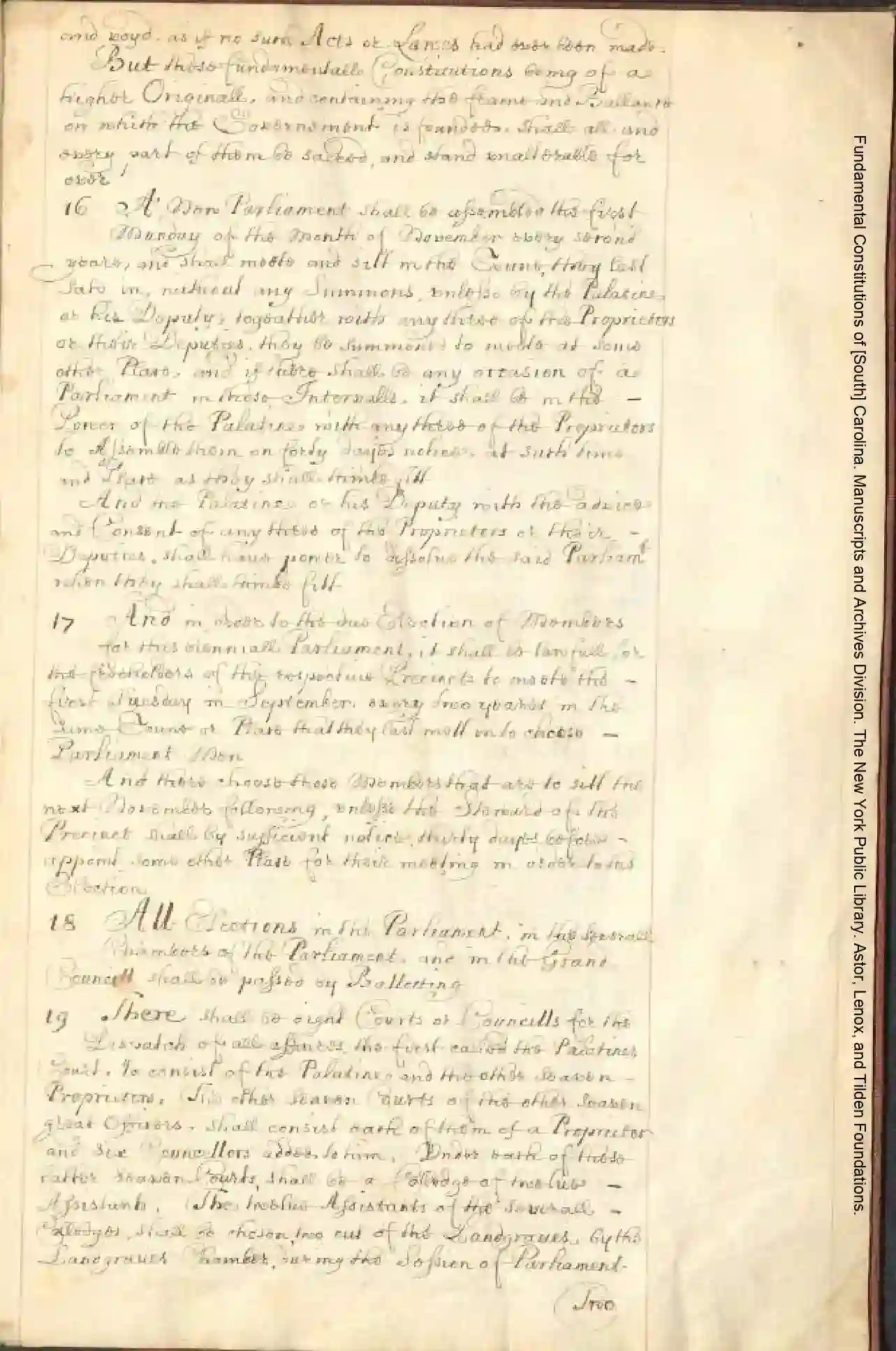
and voyd, as if no such Acts or Lawes had ever been made:
But these fundamentall Constitutions being of a
higher Originall, and containing the frame and Ballance
on which the Government is founded, shall all and
every part of them be sacred, and stand unalterable for
ever
16 A New Parliament shall be assembled the first
Munday of the Month of November every second
yeare, and shall meete and sitt in the Towne, they last
sate in, without any Summons, unlesse by the Palatine
or his Deputy; togeather with any three of the Proprietors
or their Deputies, they be summoned to meete at some
other Place, and if there shall be any occasion of a
Parliament in those Intervalls, it shall be in the
Power of the Palatine with any three of the Proprietors
to Assemble them on forty dayes notice, at such time
and Place as they shall thinke fitt
And the Palatine or his Deputy with the advice
and Consent of any three of the Proprietors or their
Deputies, shall have power to dissolve the said Parliament
when they shall thinke fitt
17 And in order to the due Election of Members
for this bienniall Parliament, it shall be lawfull for
the freeholders of the respective Precincts to meete the
first Tuesday in September, every two yeares in the
same Towne or Place that they last mett in to choose
Parliament Men
And there choose those Members that are to sitt the
next November following, unlesse the Steward of the
Precinct shall by sufficient notice, thirty dayes before
appoint some other Place for their meeting in order to the
Election
18 All Elections in the Parliament, in the severall
Chambers of the Parliament, and in the Grand
Councill shall be passed by Ballotting
19 There shall be eight Courts or Councills for the
Dispatch of all affaires, the first called the Palatines
Court, To consist of the Palatine and the other seaven
Proprietors, The other Seaven Courts of the other seaven
great Officers, shall consist each of them of a Proprietor
and six Councellors added to him, Under each of these
latter seaven Courts, shall be a Colledge of twelve
Assistants, The twelve Assistants of the severall
Colledges, shall be chosen, two out of the Landgraves, by the
Landgraves Chamber, during the Session of Parliament
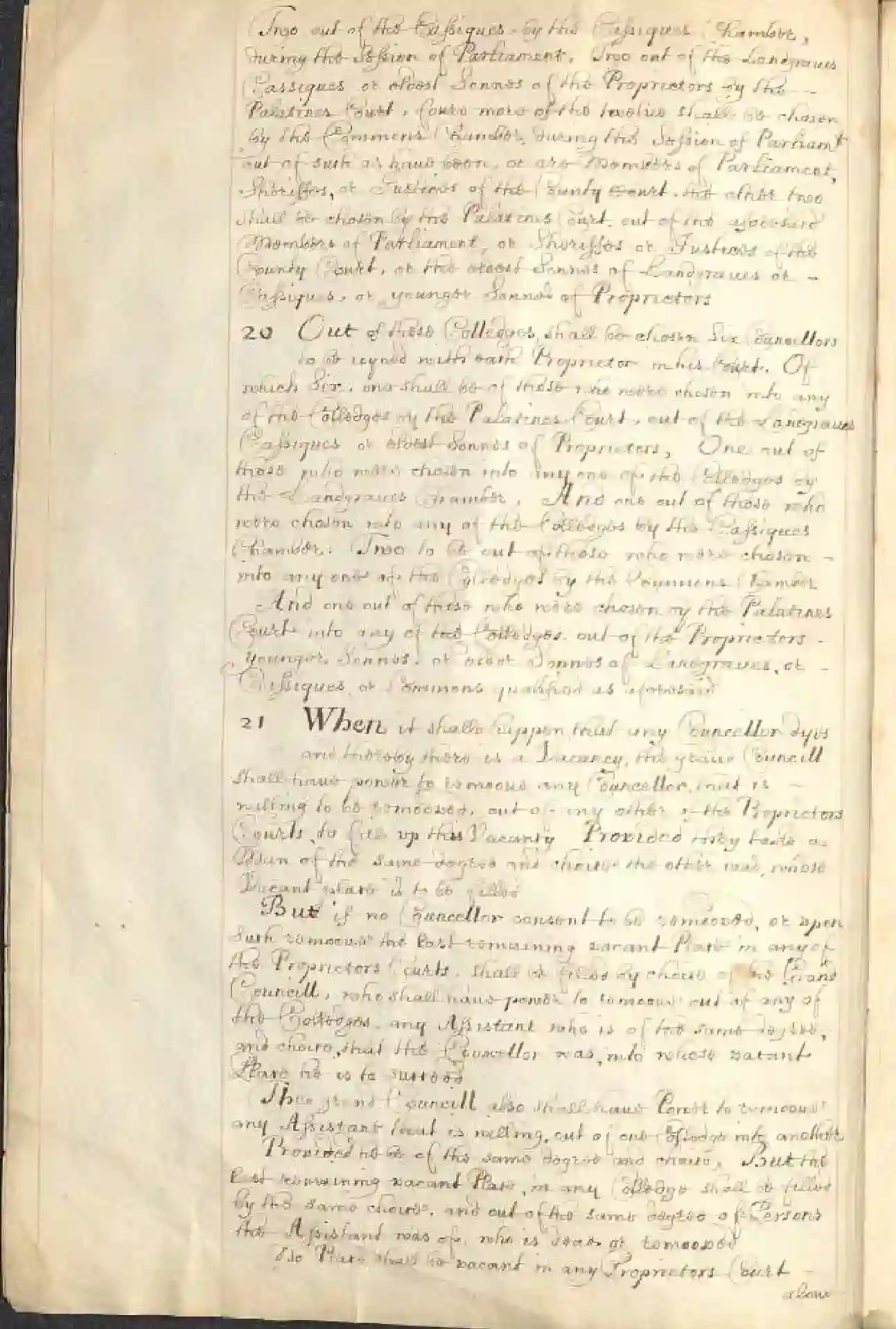
Two out of the Cassiques, by the Cassiques Chamber,
during the Session of Parliament, Two out of the Landgraves
Cassiques or oldest Sonnes of the Proprietors by the
Palatines Court, foure more of the twelve shall be chosen
by the Commons Chamber, during the Session of Parliament
out of such as have been, or are Members of Parliament,
Sheriffes, or Justices of the County Court, the other two
shall be chosen by the Palatines Court, out of the aforesaid
Members of Parliament, or Sheriffes or Justices of the
County Court, or the oldest Sonnes of Landgraves or
Cassiques, or younger Sonnes of Proprietors
20 Out of the Colledges, shall be chosen Six Councellors
to be joyned with each Proprietor in his Court, Of
which Six, one shall be of those who were chosen into any
of the Colledges by the Palatines Court, out of the Landgraves
Cassiques or oldest Sonnes of Proprietors, One out of
those who were chosen into any one of the Colledges by
the Landgraves Chambers, And one out of those who
were chosen into any of the Colledges by the Cassiques
Chamber: Two to be out of those who were chosen
into any one of the Colledges by the Commons Chamber
And one out of those who were chosen by the Palatines Court into any of the Colledges, out of the Proprietors
younger Sonnes, or older Sonnes of Landgraves, or
Cassiques, or Commons qualified as aforesaid
21 When it shall happen, that any Councellor dyes
and thereby there is a Vacancy, the grand Councill shall have power to remoove any Councellor, that is
willing to be remooved, out of any other of the Proprietors
Courts, to fill up this Vacancy Provided they take a
Man of the same degree and choise the other was, whose
Vacant place is to be filled
But if no Councellor consent to be remooved, or upon
such remoove the last remaining vacant Place in any of
the Proprietors Courts, shall be filled by choise of the Grand
Councill, who shall have powr to remoove out of any of
the Colledges, any Assistant who is of the same degree,
and choise, that the Councellor was, into whose vacant
Place he is to succeed
The grand Councill also shall have Power to remoove
any Assistant that is willing, out of one Colledge into another
Provided he be of the same degree and choise, But the
last remaining vacant Place, in any Colledge shall be filled
by the same choise, and out of the same degree of Persons
the Assistant was of, who is dead or remooved
No Place shall be vacant in any Proprietors Court
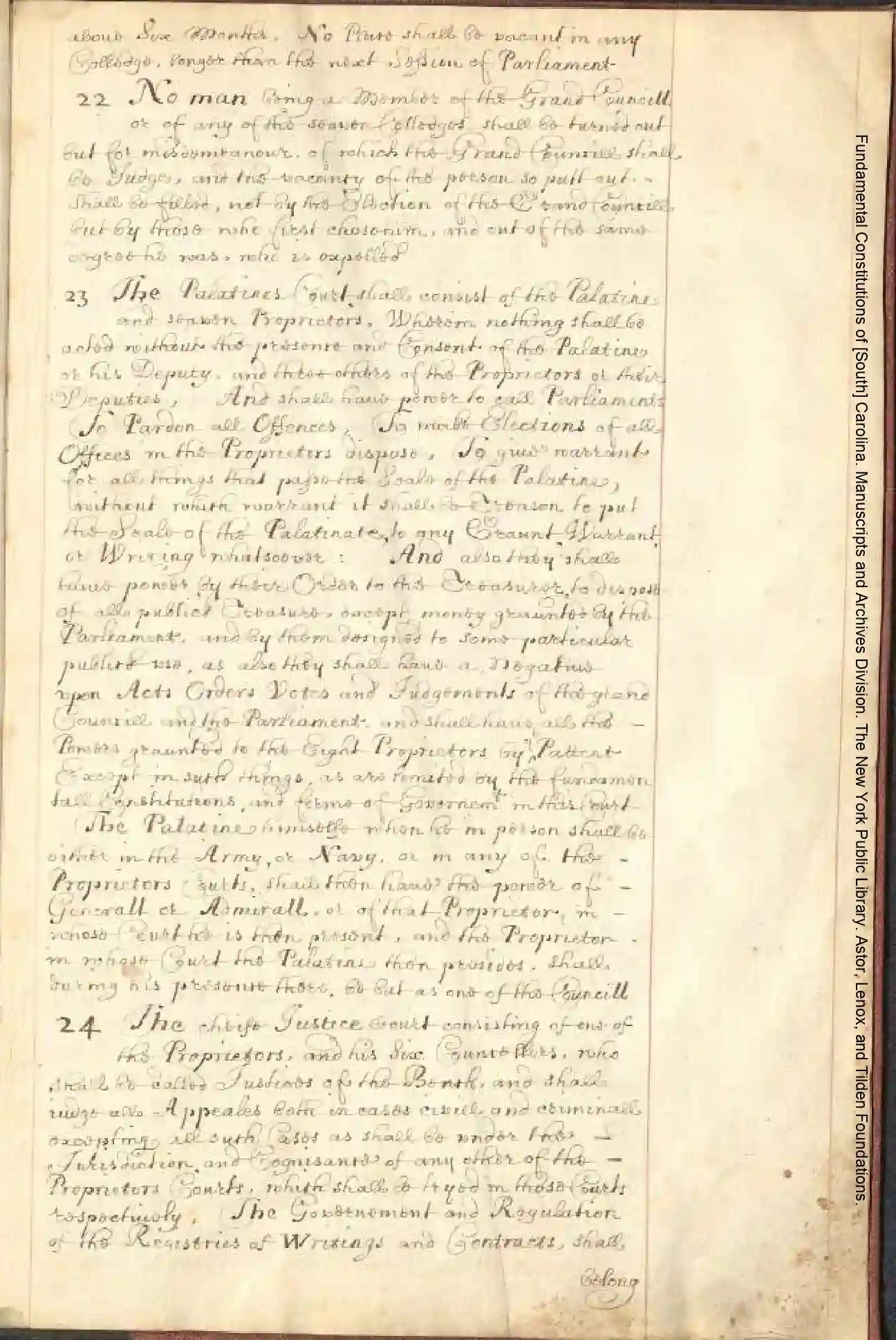
above Six Months, No Place shall be vacant in any
Colledge, longer than the next Session of Parliament
22 No man being a Member of the Grand Councill
or of any of the seaven Colledges shall be turned out
but for misdemeanour, of which the Grand Councill shall
be Judge, and the vacancy of the person so putt out
shall be filled, not by the Election of the Grand Councill
but by those who first chose him, and out of the same
degree he was, who is expelled
23 The Palatines Court, shall consist of the Palatine
and seaven Proprietors, Wherein nothing shall be
acted without the presence and Consent of the Palatine
or his Deputy, and three others of the Proprietors or their
Deputies, And shall have power to call Parliaments
To Pardon all Offences, To make Elections of all
Offices in the Proprietors dispose, To give warrant
for all things that passe the Seale of the Palatine,
without which warrant it shall be Treason to put
the Seale of the Palatinate, to any Graunt, Warrant,
or Writing whatsoever: And also they shall
have power by their Order to the Treasurer, to dispose
of all publick Treasure, except money graunted by the
Parliament, and by them designed to some particular
publick use, as also they shall have a Negative
upon Acts Orders Votes and Judgements of the grand
Councill and the Parliament, and shall have all the
Powers graunted to the Eight Proprietors by the Pattent
Except in such things, as are limited by the fundamen
tall Constitutions, and forme of Governement in this Court
The Palatine himselfe when he in person shall be
either in the Army, or Navy, or in any of the
Proprietors Courts, shall then have the power of
Generall or Admirall, or of that Proprietor, in
whose Court he is then present, and the Proprietor
in whose Court the Palatine then presides, shall
during his presence there, be but as one of the Councill
24 The cheife Justice court consisting of one of
the Proprietors, and his Six Councellors, who
shall be called Justices of the Bench, and shall
judge all Appeales both in cases civill and criminall
excepting all such Cases as shall be under the
Jurisdiction, and Cognisance of any other of the
Proprietors Courts, which shall be tryed in those Courts
respectively, The Governement and Regulation
of the Registries of Writings and Contracts, shall
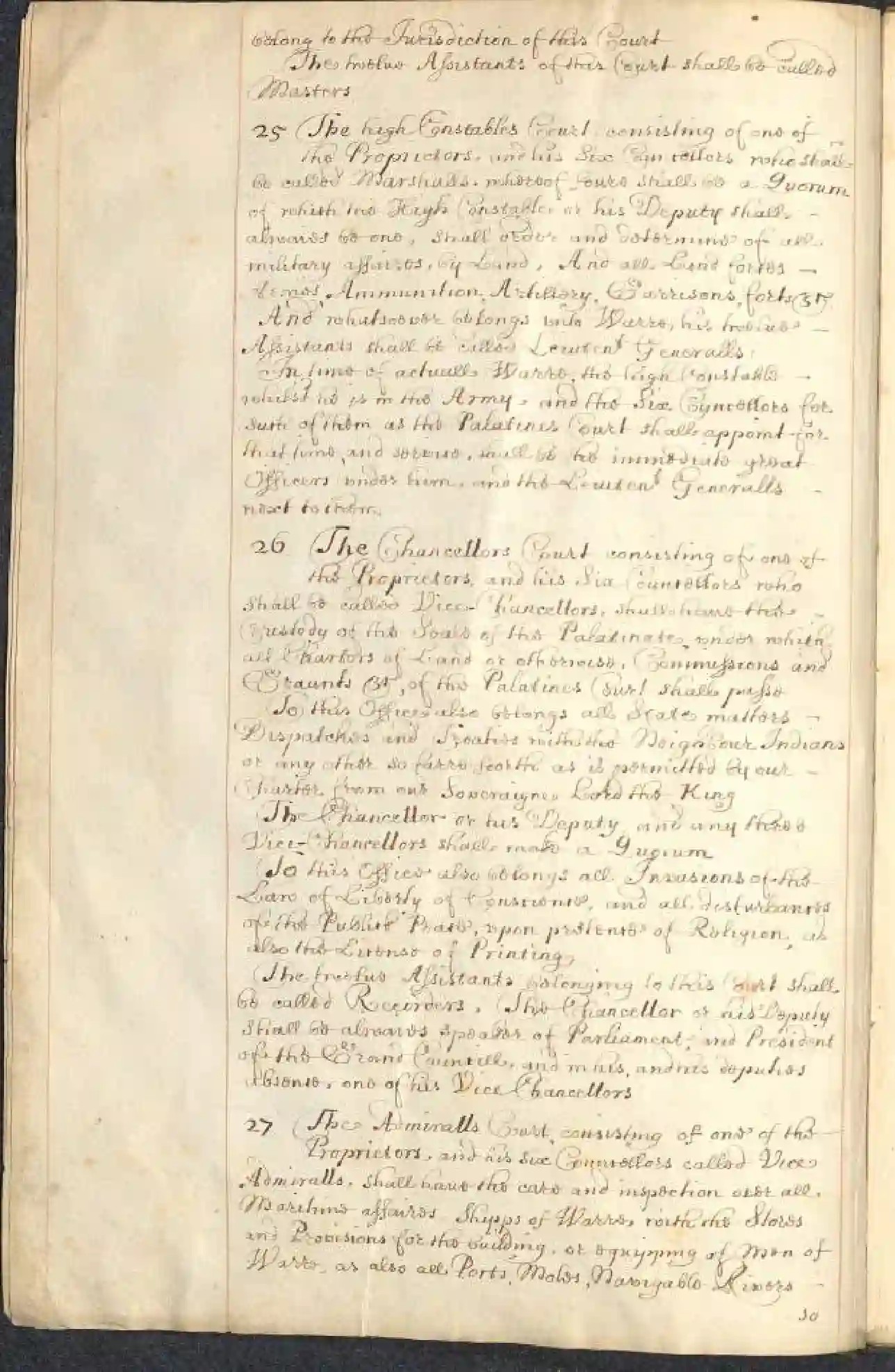
belong to the Jurisdiction of this Court
The twelve Assistants of this Court shall be called
Masters
25 The high Constables Court, consisting of one of
the Proprietors, and his Six Councellors who shall
be called Marshalls, whereof foure shall be a Quorum
of which the High Constable or his Deputy shall
alwaies be one, shall order and determine of all
military affaires, by Land, And all Land forces
Armes, Ammunition, Artillery, Garrisons, forts &c
And whatsoever belongs unto Warre, his twelve
Assistants shall be called Leiutenant Generalls:
In time of actuall Warre, the high Constable
whilst he is in the Army, and the Six Councellors for
such of them as the Palatines Court shall appoint for
that time, and service, shall be the immediate great
Officers under him, and the Leiutenant Generalls
next to them
26 The Chancellors Court consisting of one of
the Proprietors, and his Six Councellors who
shall be called Vice-Chancellors, shall have the
Custody of the Seale of the Palatinate, under which
all Charters of Land or otherwise, Commissions and
Graunts &c, of the Palatines Court shall passe
To this Office also belongs all State matters
Dispatches and Treaties with the Neighbour Indians
or any other so farre [sooeth] as is permitted by our
Charter from our Soveraigne Lord the King
The Chancellor or his Deputy, and any three
Vice-Chancellors shall make a Quorum
To this Office also belongs all Invasions of the
Law of Liberty of Conscience, and all disturbances
of the Publick Peace, upon pretence of Religion, as
also the License of Printing
The twelve Assistants belonging to this Court shall
be called Recorders, The Chancellor or his Deputy
shall be alwaies Speaker of Parliament, and President
of the Grand Councill, and in his, and his deputies
absence, one of his Vice Chancellors
27 The Admiralls Court, consisting of one of the
Proprietors, and his six Councellors called Vice
Admiralls, shall have the care and inspection over all
Maritime affaires, Shipps of Warre, with the Stores
and Provisions for the building, or equipping of Men of
Warre, as also all Ports, Moles, Navigable Rivers
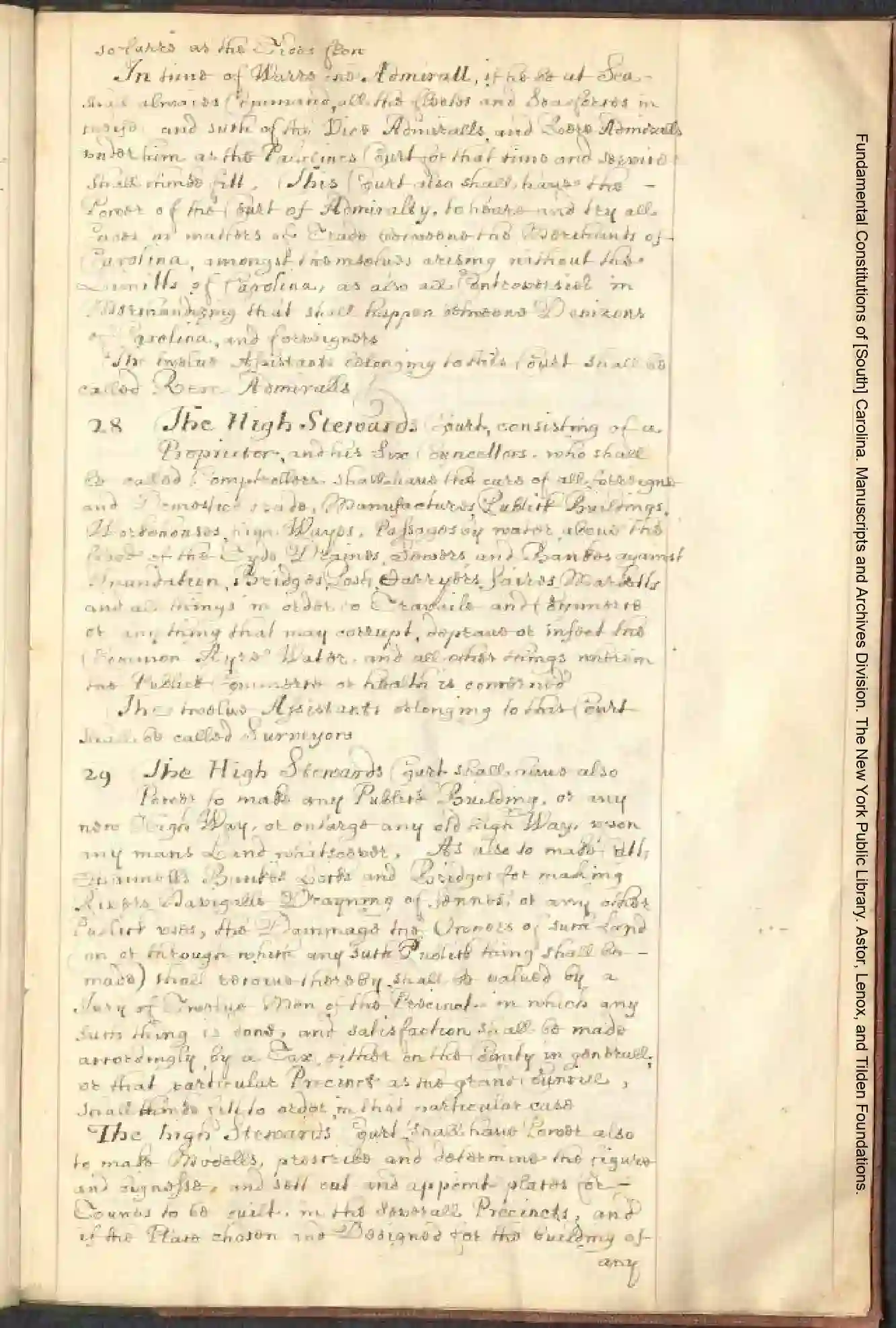
so farre as the Tides flow
In time of Warre the Admirall, if he be at Sea
shall alwaies Command, all the fleetes and Seaforces in
cheife, and such of the Vice Admiralls, and Rere Admiralls
under him as the Palatines Court for that time and service
shall thinke fitt, This Court also shall have the
Power of the Court of Admiralty, to heare and try all
Cases in matters of Trade betweene the Merchants of
Carolina, amongst themselves arising without the
Limitts of Carolina, as also all Controversies in
Merchandizing that shall happen betweene Denizons
of Carolina, and forreigners
The twelve Assistants belonging to this Court shall be
called Rere Admiralls
28 The High Stewards Court, consisting of a
Proprietor, and his Six Councellors, who shall
be called Comptrollers, shall have the care of all forreigne
and Domestick trade, Manufactures, Publick Buildings,
Workehouses, high Wayes, Passages by water, above the
flood of the Tyde, Draines, Sewers, and Bankes against
Inundation, Bridges, Posts, Carryers, faires Marketts
and all things in order to Travaile and Commerce
or any thing that may corrupt, deprave or infect the
Common Ayre Water, and all other things wherein
the Publick Commerce or health is concerned
The twelve Assistants belonging to this Court
shall be called Surveyors
29 The High Stewards Court shall have also
Power to make any Publick Building, or any
new High Way, or enlarge any old high Way, upon
any mans Lands whatsoever, As also to make Cutts
Channells Bankes [Locks] and Bridges for making
Rivers Navigable Drayning of fennes, or any other
Publick uses, the Dammage the Owners of such Land
(on or through which any such Publick thing shall be
made) shall receive thereby, shall be valued by a
Jury of Twelve Men of the Precinct in which any
such thing is done, and satisfaction shall be made
accordingly, by a Tax, either on the County in generall;
or that particular Precinct as the grand Councill,
shall thinke fitt to order in that particular case
The high Stewards Court, shall have Power also
to make Modells, prescribe and determine the figure
and bignesse, and sett out and appoint places for
Townes to be built, in the severall Precincts, and
if the Place chosen and Designed for the building of
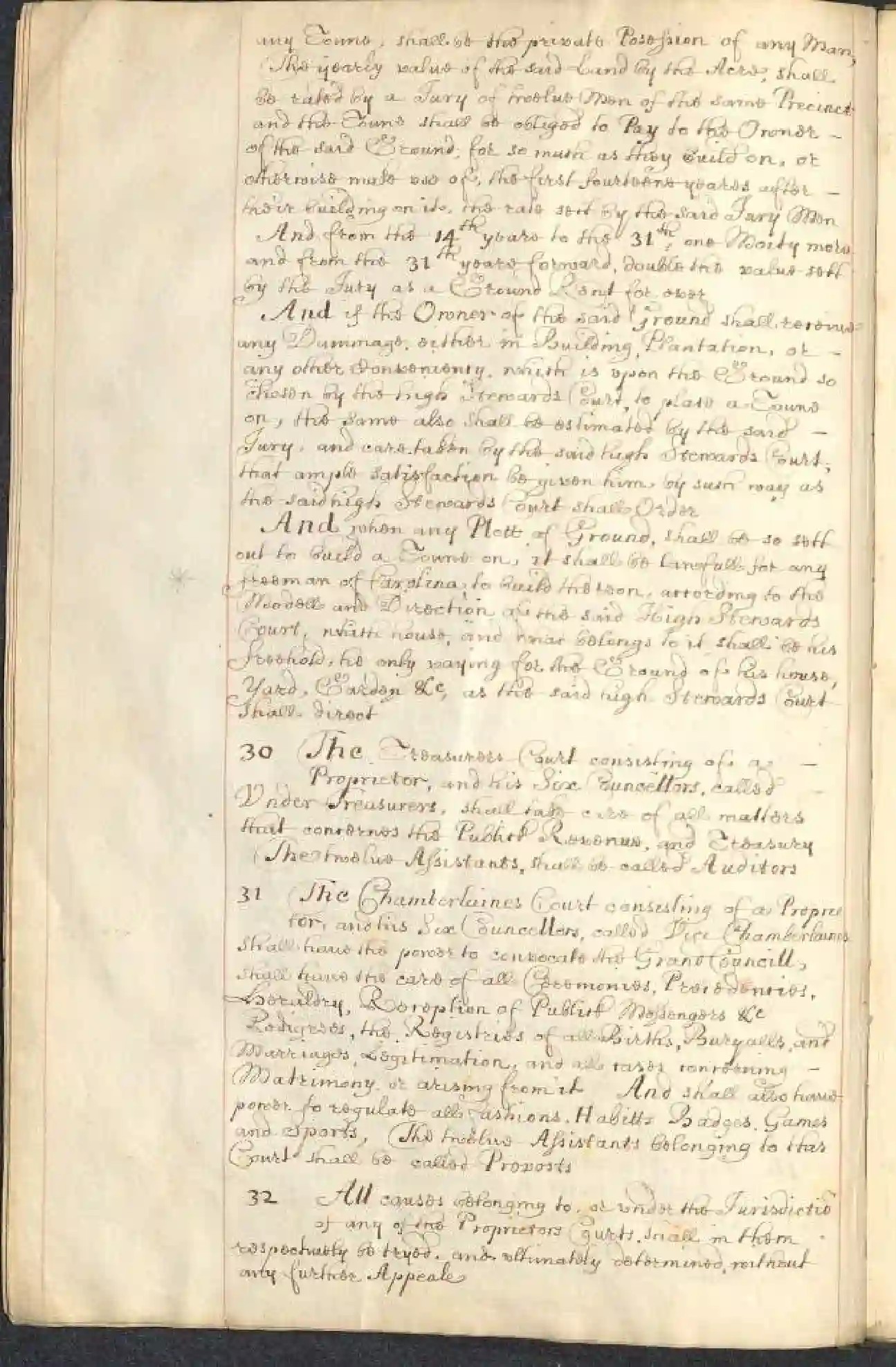
any Towne, shall be the private Posession of any Man,
The yearly value of the said Land by the Acre, shall
be rated by a Jury of twelve Men of the same Precinct
and the Towne shall be obliged to Pay to the Owner
of the said Ground, for so much as they build on, or
otherwise make use of, the first fourteene yeares after
their building on it, the rate sett by the said Jury Men
And from the 14th yeare to the 31th, one Moity more
and from the 31th yeare forward, double the value sett
by the Jury as a Ground Rent for ever
And if the Owner of the said Ground shall receive
any Dammage, either in Building, Plantation, or
any other conveniency, which is upon the Ground so
chosen by the high Stewards Court, to place a Towne
on, the same also shall be estimated by the said
Jury, and care taken by the said high Stewards Court,
that ample satisfaction be given him, by such way as
the said high Stewards Court shall Order
And when any Plott of Ground, shall be so sett
out to build a Towne on, it shall be lawfull for any
{*} freeman of Carolina, to build thereon, according to the
Modell and Direction of the said High Stewards
Court, which house, and what belongs to it, shall be his
freehold, he only paying for the Ground of his house,
Yard, Garden &c, as the said high Stewards Court
shall direct
30 The Treasurers Court consisting of a
Proprietor, and his Six Councellors, called
Under Treasurers, shall take care of all matters
that concernes the Publick Revenue, and Treasury
The twelve Assistants, shall be called Auditors
31 The Chamberlaines Court consisting of a Proprie
tor, and his Six Councellors, called Vice Chamberlaines
shall have the powr to convocate the Grand Councill,
shall have the care of all Ceremonies, Precedencies,
heraldry, Reception of Publick Messengers &c
Pedigrees, the Registries of all Births, Buryalls, and
Marriages, Legitimation, and all cases concerning
Matrimony, or arising from it And shall also have
power to regulate all fashions, Habitts Badges, Games
and Sports, The twelve Assistants belonging to this
Court shall be called Provosts
32 All causes belonging to, or under the Jurisdiction
of any of the Proprietors Courts, shall in them
respectively be tryed, and ultimately determined, without
any further Appeale
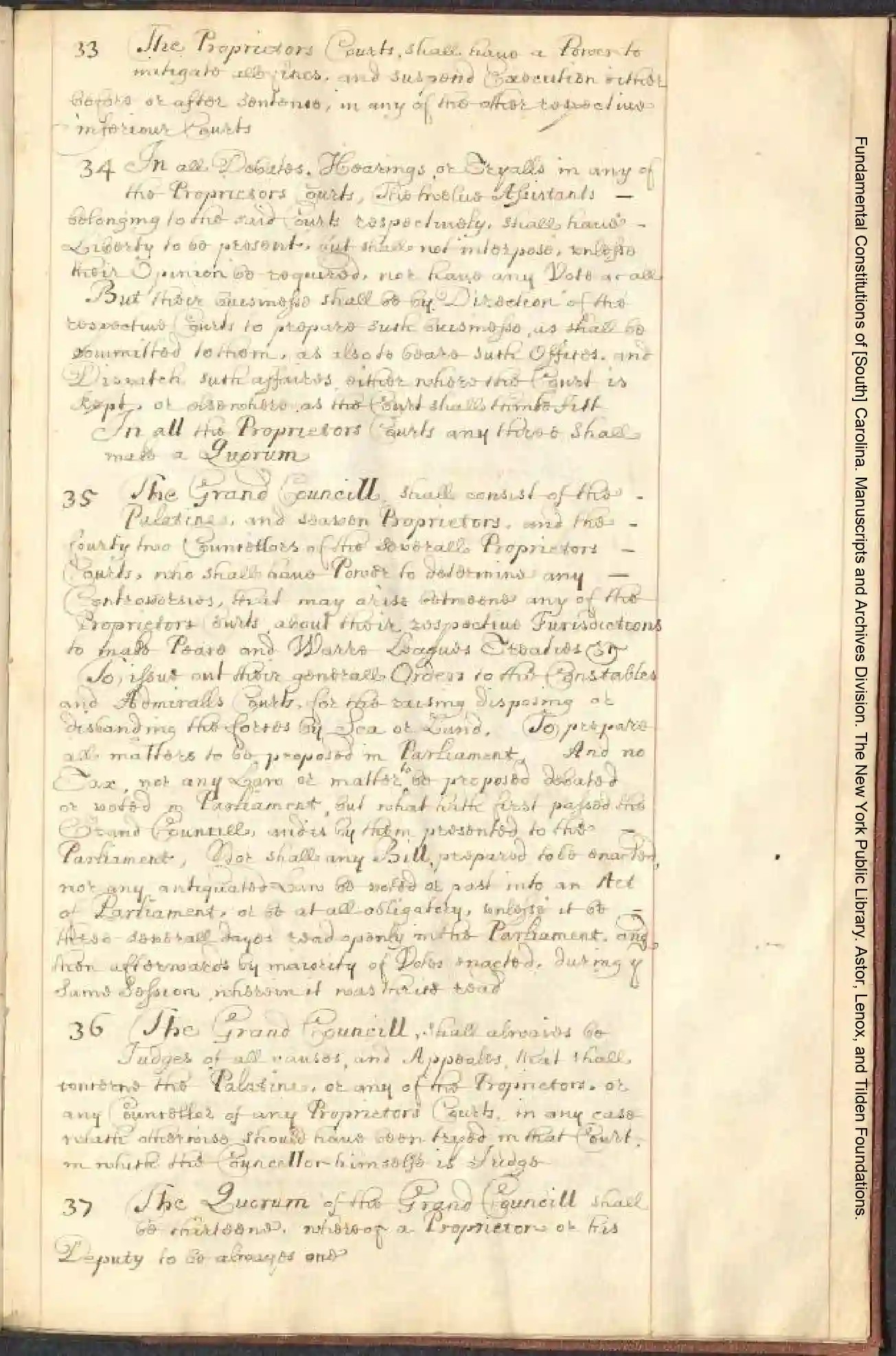
33 The Proprietors Courts, shall have a Power to
mitigate all fines, and suspend Execution either
before or after sentence, in any of the other respective
inferiour Courts
34 In all Debates, Hearings, or Tryalls in any of
the Proprietors Courts, The twelve Assistants
belonging to the said Courts respectively, shall have
Liberty to be present, but shall not interpose, unlesse
their Opinion be required, nor have any Vote at all
But their businesse shall be by Direction of the
respective Courts to prepare such buisinesse, as shall be
committed to them, as also to beare such Officers, and
Dispatch such affaires, either where the Court is
kept, or elsewhere, as the Court shall thinke fitt
In all the Proprietors Courts any three shall
make a Quorum
35 The Grand Councill, shall consist of the
Palatine, and seaven Proprietors, and the
fourty two Councellors of the severall Proprietors
Courts, who shall have Power to determine any
Controversies, that may arise betweene any of the
Proprietors Courts, about their respective Jurisdictions
to make Peace and Warre Leagues Treaties &c
To issue out their generall Orders to the Constables
and Admiralls Courts, for the raising disposing or
disbanding the forces by Sea or Land, To prepare
all matters to be proposed in Parliament, And no
Tax, nor any Law or matter to be proposed debated
or voted in Parliament, but what hath first passed the
Grand Councill, and is by them presented to the
Parliament, Nor shall any Bill, prepared to be enacted,
nor any antiquated Law be voted or past into an act
of Parliament, or be at all obligatory, unlesse it be
three severall dayes read openly in the Parliament, and
then afterwards by majority of Votes enacted, during the
Same Session, wherein it was thrice read
36 The Grand Councill, shall alwaies be
Judges of all causes, and Appeales, that shall
concerne the Palatine, or any of the Proprietors, or
any Councellor of any Proprietors Courts, in any case
which otherwise should have been tryed in that Court,
in which the Councellor himselfe is Judge
37 The Quorum of the Grand Councill shall
be thirteene, whereof a Proprietor or his
Deputy to be alwayes one
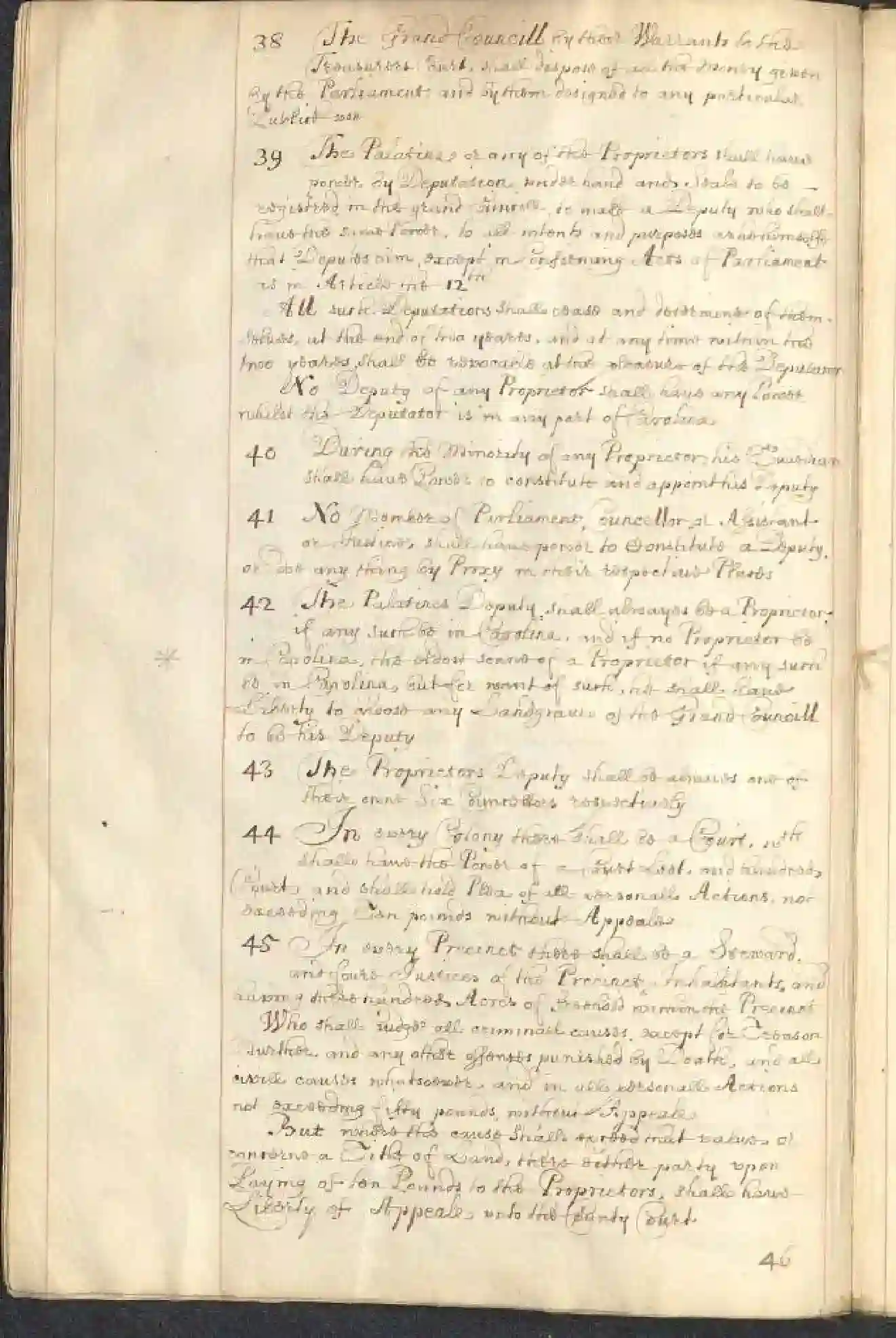
38 The Grand Councill by their Warrants to the
Treasurers Court, shall dispose of all the Money given
by the Parliament, and by them designed to any particular
Publick use
39 The Palatine or any of the Proprietors shall have
power by Deputation under hand and Seale to be
registred in the grand Councill, to make a Deputy who shall
have the same Power, to all intents and purposes as he himselfe
that Deputes him, except in Confirming Acts of Parliament
as in Article the 12th
All such Deputations shall cease and determine of them-
selves, at the end of two yeares, and at any time within the
two yeares, shall be revocable at the pleasure of the Deputator
No Deputy of any Proprietor shall have any Power
whilst the Deputator is in any part of Carolina
40 During the Minority of any Proprietor, his Guardian
shall have Power to constitute and appoint his Deputy
41 No Member of Parliament, Councellor, or Assistant
or Justice, shall have power to Constitute a Deputy,
or doe any thing by Proxy in their respective Places
42 The Palatines Deputy, shall alwayes be a Proprietor,
if any such be in Carolina, and if no Proprietor be
{*} in Carolina, the eldest sonne of Proprietor if any such
be in Carolina, but for want of such, he shall have
Liberty to choose any Landgrave of the Grand Councill
to be his Deputy
43 The Proprietors Deputy shall be alwaies one of
their owne Six Councellors respectively
44 In every Colony there shall be a Court, which
shall have the Power of a Court Leet, and hundred
Court, and shall hold Plea of all personall Actions, not
exceeding Ten pounds without Appeale
45 In every Precinct there shall be a Steward,
and foure Justices of the Precinct, Inhabitants, and
having three three hundred Acres of freehold within the Precinct
Who shall judge all criminall causes, except for Treason
Murther, and any other offences punished by Death, and all
civill causes whatsoever, and in all personall Actions
not exceeding fifty pounds, without Appeale
But where the cause shall exceed that value, or
concerne a Title of Land, there either party upon
Paying of ten Pounds to the Proprietors, shall have
Liberty of Appeale unto the County Court
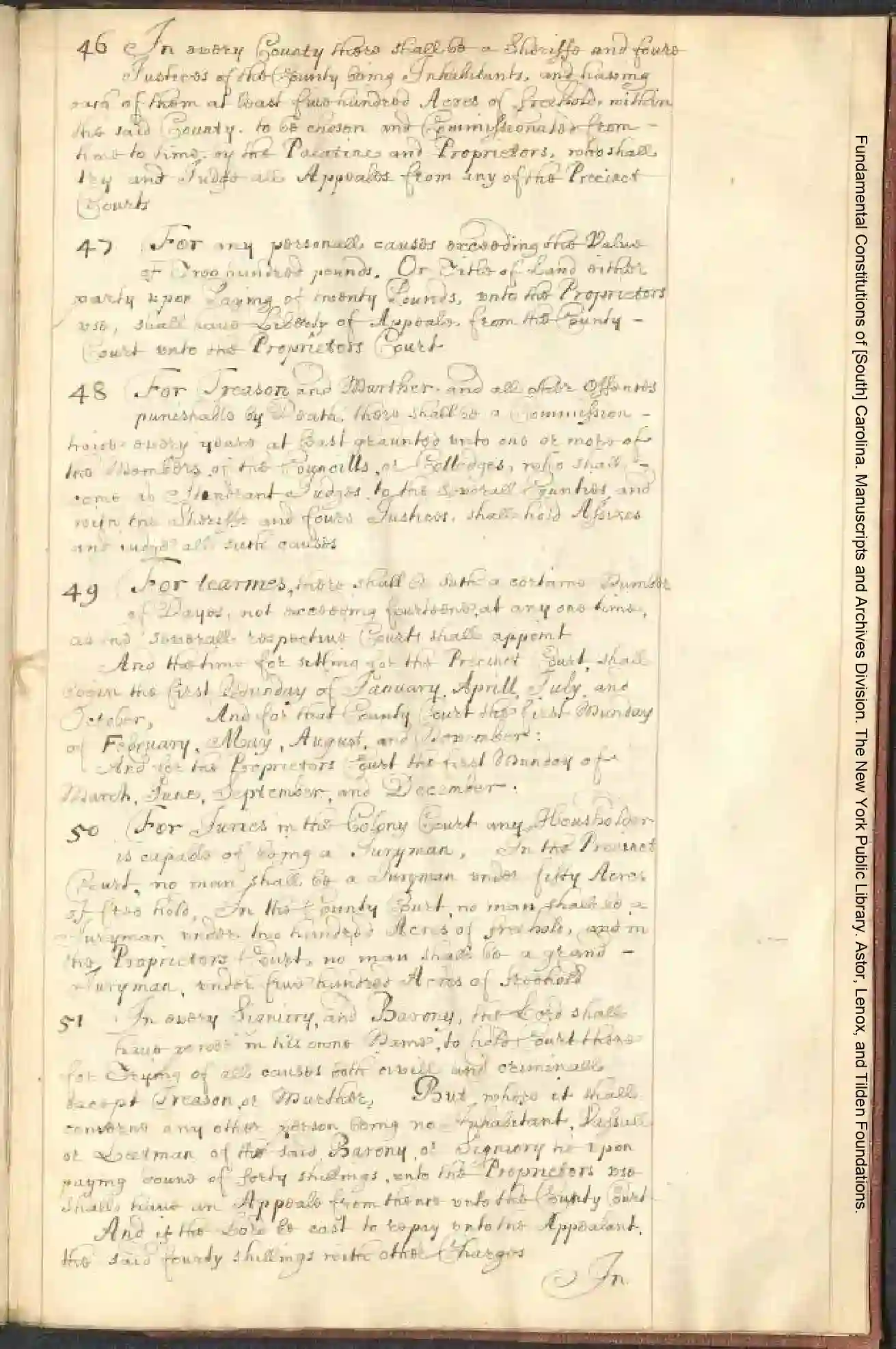
46 In every County there shall be a Sheriffe and foure
Justices of the County being Inhabitants, and having
each of them at least five hundred Acres of freehold, within
the said County, to be chosen and Commissionated from
time to time, by the Palatine and Proprietors, who shall
try and Judge all Appeales from any of the Precinct
Courts
47 For any personall causes exceeding the Value
of Two hundred pounds, Or Title of Land either
party upon Paying of twenty Pounds, unto the Proprietors
use, shall have Liberty of Appeale, from the County
Court unto the Proprietors Court
48 For Treason and Murther, and all other Offences
punishable by Death, there shall be a Commission
twice every yeare at least graunted unto one or more of
the Members of the Councills, or Colledges, who shall
come as Itinerant Judges, to the severall Counties, and
with the Sheriffe and foure Justices, shall hold Assizes
and judge all such causes
49 For tearmes, there shall be such a certaine Number
of Dayes, not exceeding fourteene, at any one time,
as the severall respective Courts shall appoint
And the time for sitting for the Precinct Court, shall
begin the first Munday of January, Aprill, July, and
October, And for that County Court the first Munday
of February, May, August, and November:
And for the Proprietors Court the first Munday of
March, June, September, and December:
50 For Juries in the Colony Court any Housholder
in capable of being a Juryman, In the Precinct
Court, no man shall be a Juryman under fifty Acres
of free hold, In the County Court, no man shall be a
Juryman under two hundred Acres of freehold, and in
the Proprietors Court, no man shall be a grand –
Juryman, under five hundred Acres of freehold
51 In every Signiory, and Barony, the Lord shall
have power in his owne Name, to hold Court there
for Trying of all causes both civill and criminall
except Treason, or Murther, But where it shall
concerne any other person being no Inhabitant, Vassall
or Leetman of the said Barony, or Signiory he upon
paying downe of forty shillings, unto the Proprietors use
shall have an Appeale from thence unto the County Court
And if the Lord be cast to repay unto the Appealant,
the said fourty shillings with other Charges
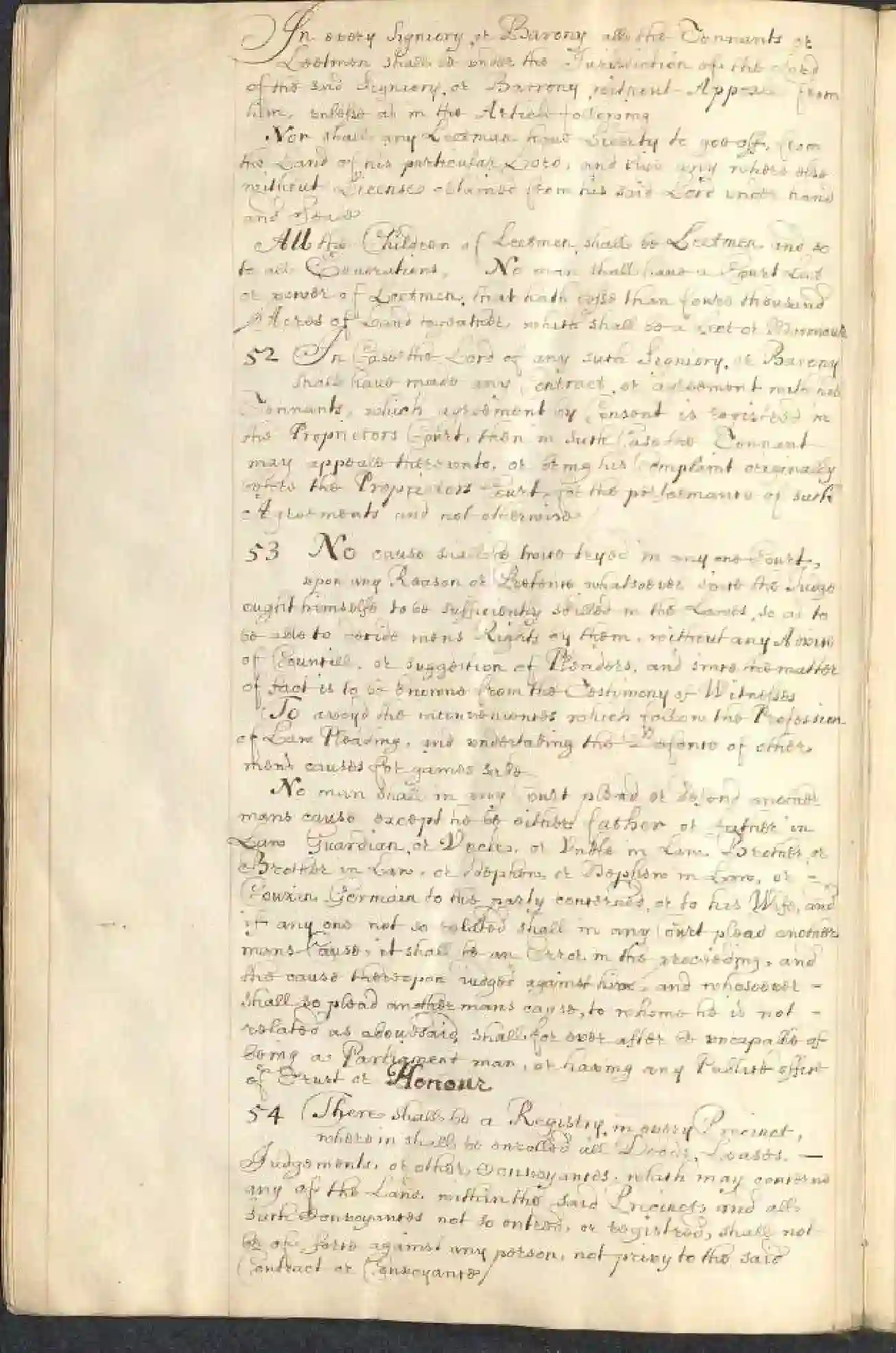
In every Signiory, or Barony all the Tennants or
Leetmen shall be under the Jurisdiction of the Lord
of the said Signiory, or Barrony, without Appeale from
him, unlesse as in the Article following
Nor shall any Leetman have Liberty to goe off, from
the Land of his particular Lord, and live any where else
without License claimed from his said Lord under hand
and Seale
All the Children of Leetmen, shall be Leetmen and so
to all Generations, No man shall have a Court Leet
or power of Leetmen, that hath lesse than foure thousand
Acres of Land togeather, which shall be a Leet or Mannour.
52 In Case the Lord of any such Signiory, or Barony
shall have made any Contract, or agreement with his
Tennants, which agreement by Consent is registred in
the Proprietors Court, then in such Case the Tennant
may appeale thereunto, or bring his Complaint originally
before the Proprietors Court, for the performance of such
Agreements and not otherwise /
53 No cause shall be twice tryed in any one Court,
upon any reason or Pretence whatsoever since the Judge
ought himselfe to be sufficiently skilled in the Lawes, so as to
be able to [deride] mens Rights by them, without any Advice
of Councill, or suggestion of Pleaders, and into the matter
of fact is to be knowne from the Testimony of Witnesses.
To avoyd the inconveniences which follow the Profession
of Law Pleading, and undertaking the Defence of other
men’s causes for games sake
No man shall in any Court plead or defend another
mans cause except he be either father or father in
Law Guardian, or Uncle, or Uncle in Law, Brother, or
Brother in Law, or Nephew, or Nephew in Law, or
Couzin Germain to the party concerned, or to his Wife, and
if any one not so related shall in any Court plead another
mans Cause, it shall be an Error in the proceeding, and
the cause thereupon judged against him, and whosoever
shall so plead another mans cause, to whome he is not
related as abovesaid, shall for ever after be uncapable of
being a Parliament man, or having any Publick office
of Trust or Honour
54 There shall be a Registry, in every Precinct,
wherein shall be enrolled all Deeds, Leases,
Judgements, or other convoyances, which may concerne
any of the Land within the said Precincts and all
such conveyances not so entred, or registred, shall not
be of force against any person, not privy to the said
Contract or Convoyance /
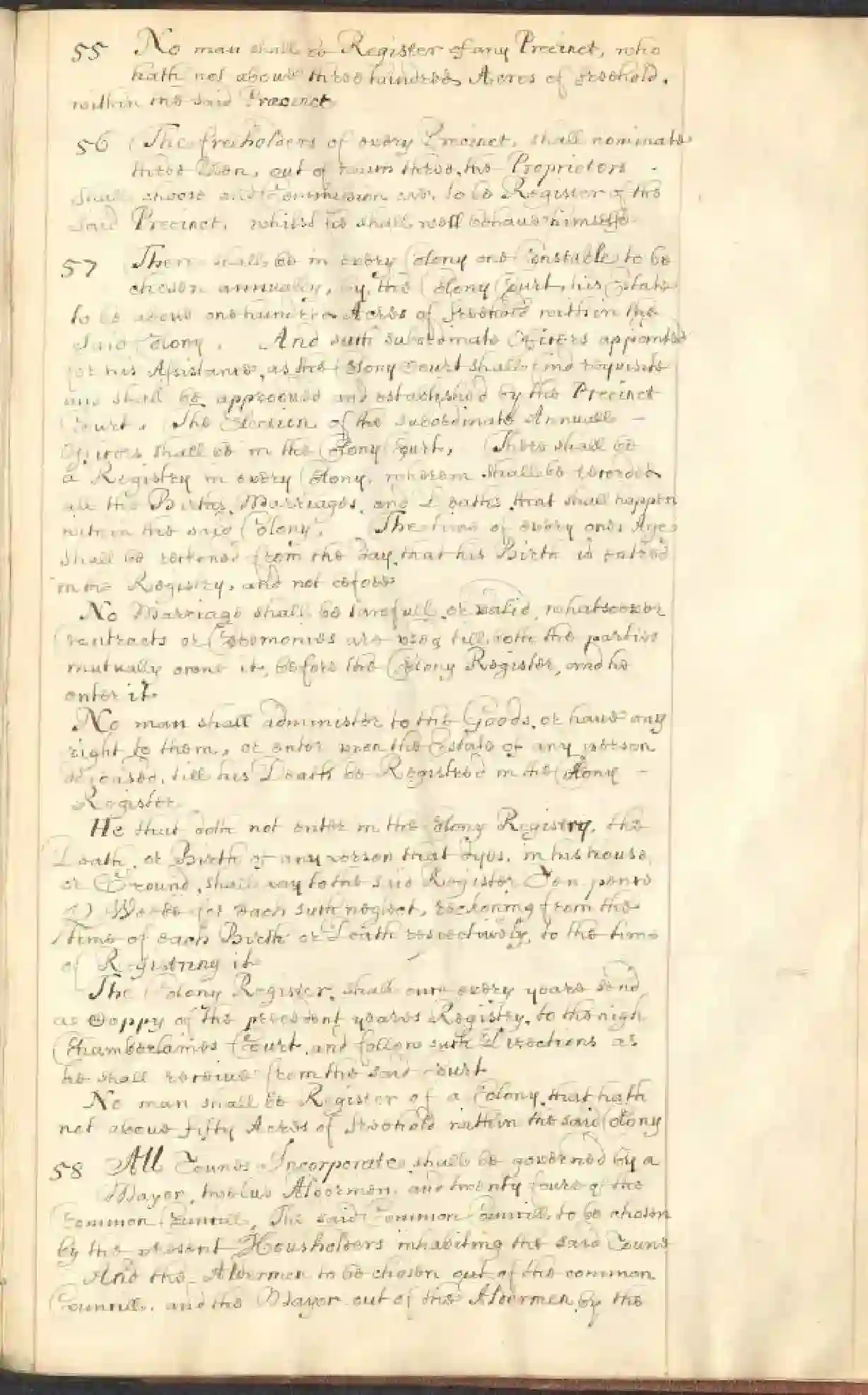
55 No man shall be Register of any Precinct, who
hath not above three hundred Acres of freehold,
within the said Precinct
56 The freeholders of every Precinct, shall nominate
three Men, out of which three, the Proprietors
shall choose and Commission one, to be Register of the
said Precinct, whilst he shall well behave himselfe
57 There shall be in every Colony one Constable to be
chosen annually, by the Colony Court, his Estate
to be above one hundred Acres of freehold within the
said Colony, And such subordinate Officers appointed
for his Assistance, as the Colony Court shall find requisite
and shall be approoved and established by the Precinct
Court. The Election of the subordinate Annuall
Officers shall be in the Colony Court, There shall be
a Registry in every Colony, wherein shall be recorded
all the Births, Marriages, and Deaths, that shall happen
within the said Colony, The time of every ones Age
shall be reckoned from the day, that his Birth is entred
in the Registry, and not before
No Marriage shall be lawfull, or valid, whatsoever
Contracts or Ceremonies are used, till both the parties
mutually owne it, before the Colony Register, and he
enter it
No man shall administer to the Goods, or have any
right to them, or enter upon the Estate of any person
deceased, till his Death be Registred in the Colony
Register
He that doth not enter in the Colony Registry, the
Death, or Birth of any person that dyes, in his house,
or Ground, shall pay to the said Register Ten pence
per Week for each such neglect, reckoning from the
time of each Birth or Death respectively, to the time
of Registring it
The Colony Register, shall once every yeare send
a coppy of the precedent yeares Registry, to the high
Chamberlaines Court and follow such Directions as
he shall receive from the said Court
No man shall be Register of a Colony, that hath
not above fifty Acres of freehold within the said Colony
58 All Townes Incorporate shall be governed by a
Mayor, twelve Aldermen, and twenty foure of the
Common Councill, The said Common Councill to be chosen
by the present Housholders inhabiting the said Towne
And the Aldermen to be chosen out of the common
Councill, and the Mayor out of the Aldermen, by the
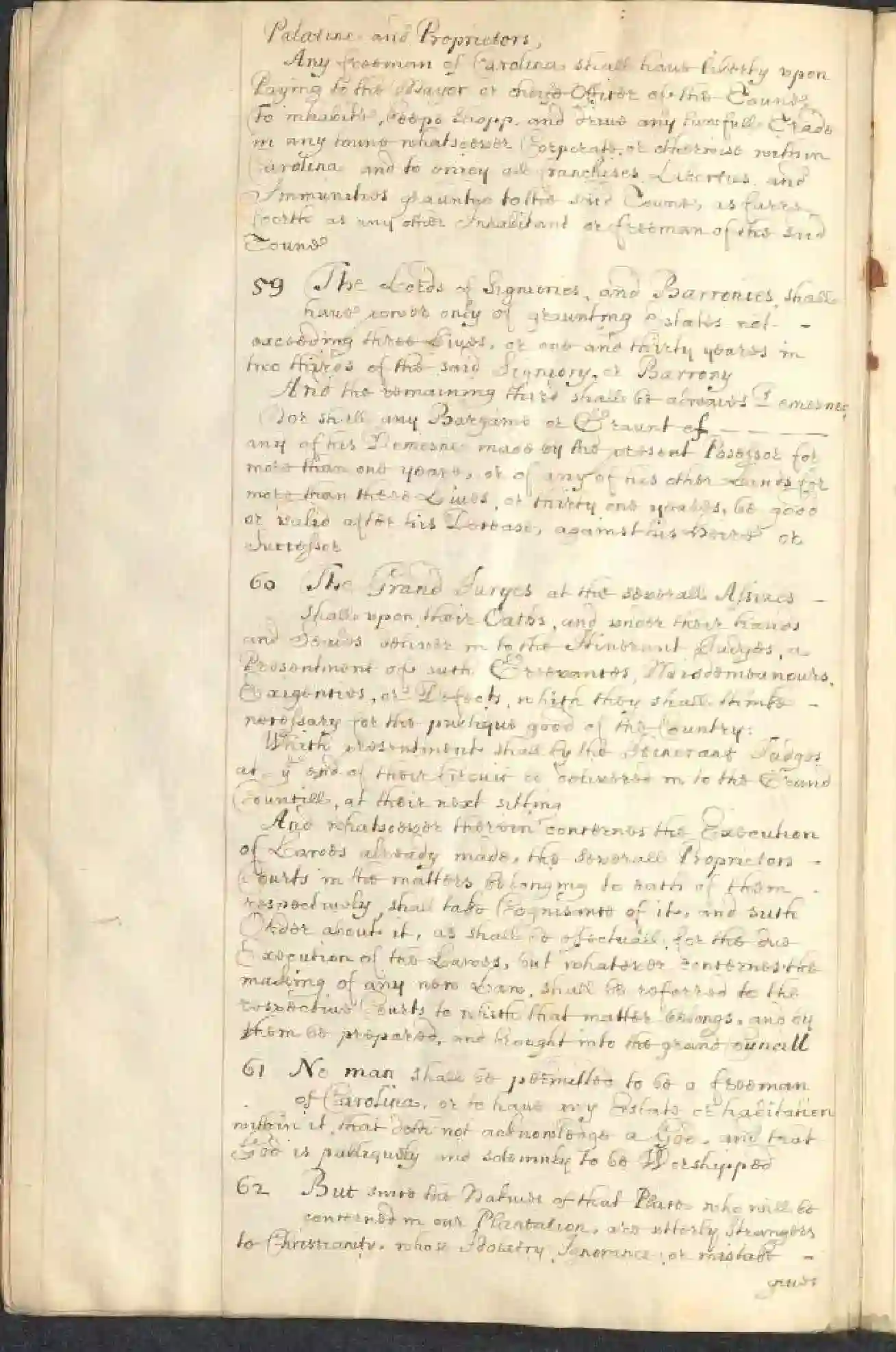
Palatine and Proprietors
Any freemen of Carolina shall have liberty upon
Paying to the Mayor or cheife Officer of the Towne,
To inhabite, keepe Shopp, and drive any lawfull Trade
in any towne whatsoever Corporate, or otherwise within
Carolina and to enjoy all franchises Liberties and
Immunities graunted to the same Towne, as farre
foorth as any other Inhabitant or freeman of the said
Towne
59 The Lords of Signiories, and Barronies, shall
have power only of graunting Estates not
exceeding three Lives, or one and thirty yeares in
two thirds of the said Signiory, or Barrony
And the remaining third shall be alwaies Demesne,
Nor shall any Bargaine or Graunt of ____
any of his Demesne made by the present Posessor for
more than one yeare, or of any of his other Lands for
more than three Lives, or thirty one yeares, be good
or valid after his Decease, against his heire or
Successor
60 The Grand Juryes at the severall Assizes
shall upon their Oaths, and under their hands
and Seales deliver in to the Itinerant Judges, a
Presentment of such Greevances, Misdemeanours,
Exigencies, or Defects, which they shall thinke
necessary for the publique good of the Country:
Which presentment shall by the Itinerant Judges
at the end of their Circuit be delivered in to the Grand
Councill, at their next sitting
And whatsoever therein concernes the Execution
of Lawes already made, the severall Proprietors
Courts in the matters belonging to each of them
respectively, shall take Cognisance of it, and such
Order about it, as shall be effectuall, for the due
Execution of the Lawes, but whatever concernes the
making of any new Law, shall be referred to the
respective Courts to which that matter belongs, and by
them be prepared, and brought into the grand Councill
61 No man shall be permitted to be a freeman
of Carolina, or to have any Estate or habitation
within it, that doth not acknowledge a God, and that
God is publiquely and solemnly to be Worshipped
62 But since the Natives of that Place, who will be
concerned in our Plantation, are utterly Strangers
to Christianity, whose Idolatry, Ignorance, or mistake
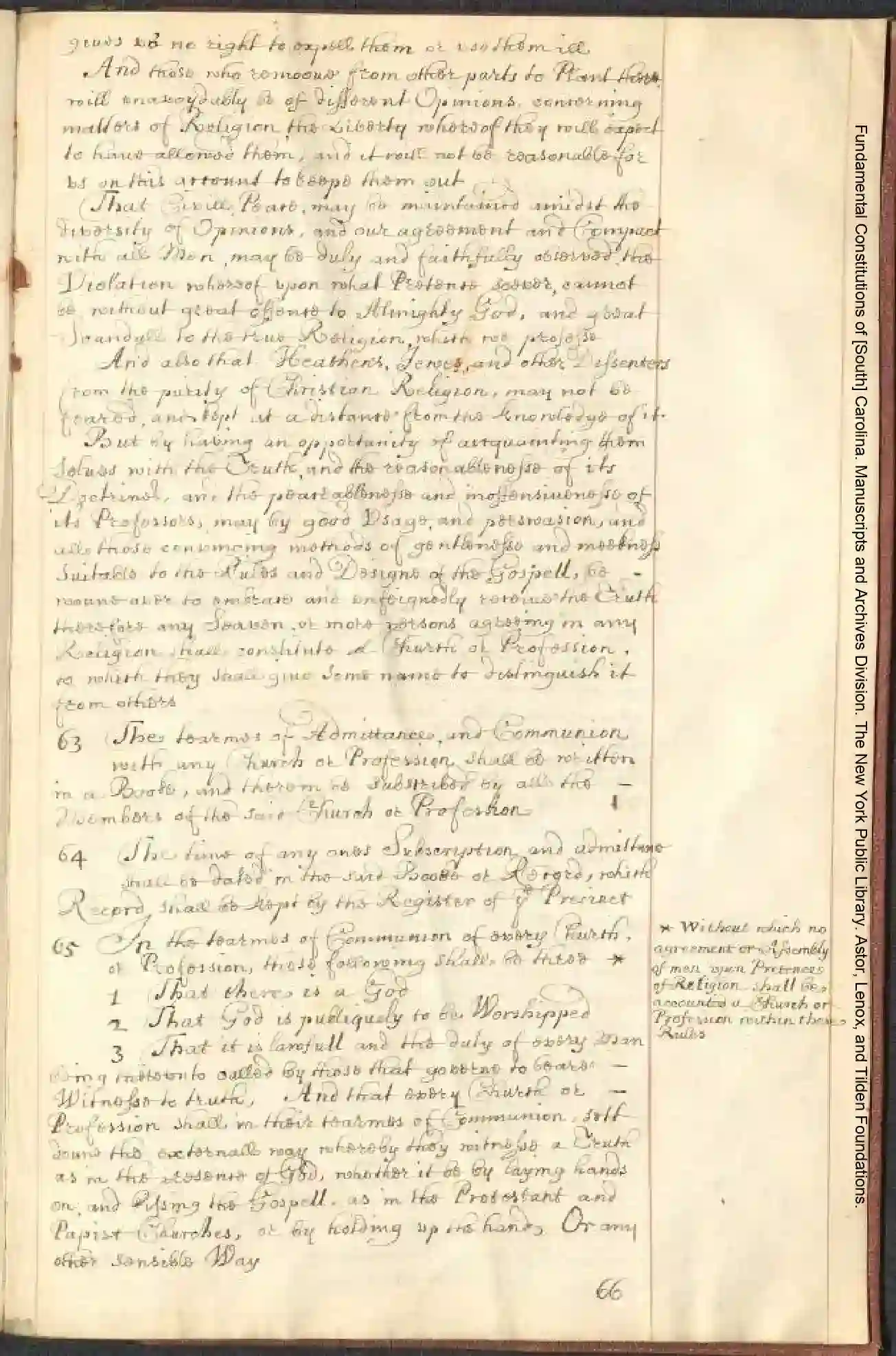
gives us no right to expell them or use them ill
And those who remoove from other parts to Plant there,
will unavoydably be of different Opinions, concerning
matters of Religion, the Liberty whereof they will expect
to have allowed them, and it will not be reasonable for
us on this account to keepe them out
That Civill Peace, may be maintained amidst the
diversity of Opinions, and our agreement and Compact
with all Men, may be duly and faithfully observed the
Violation whereof upon what Pretence soever, cannot
be without great offence to Almighty God, and great
Scandall to the true Religion, which we professe
And also that Heathens, Jewes, and other Dissenters
from the purity of Christian Religion, may not be
feared, and kept at a distance from the knowledge of it
But by having an opportunity of accquainting them
Selves with the Truth, and the reasonablenesse of its
Doctrines, and the peaceablenesse and inoffensivenesse of
its Professors, may by good Usage, and perswasion, and
all those convincing methods of gentlenesse and meekness
Suitable to the Rules and Designe of the Gospell, be
wonne over to embrace and unfeignedly receive the Truth
therefore any Season, or more persons agreeing in any
Religion shall constitute a Church or Profession,
to which they shall give some name to distinguish it
from others
63 The tearmes of Admittance, and Communion
with any Church or Profession, shall be written
in a Booke, and therein be subscribed by all the
Members of the said Church or Profession
64 The time of any ones Subscription and admittance
shall be dated in the said Booke or Record, which
Record shall be kept by the Register of the Precinct
65 In the tearmes of Communion of every Church,
or Profession, these following shall be three *Without which no agreement or Assembly of men upon Pretence of Religion, shall be accounted a Church or Profession within these Rules
1 That there is a God
2 That God is publiquely to be Worshipped
3 That it is lawfull and the duty of every Man
being thereunto called by those that governe to beare
Witnesse to truth, And that every Church or
Profession shall in their tearmes of Communion, sett
downe the externall way whereby they witnesse a Truth
as in the presence of God, whether it be by laying hands
on, and kissing the Gospell, as in the Protestant, and
Papist Churches, or by holding up the hand, Or any
other sensible Way
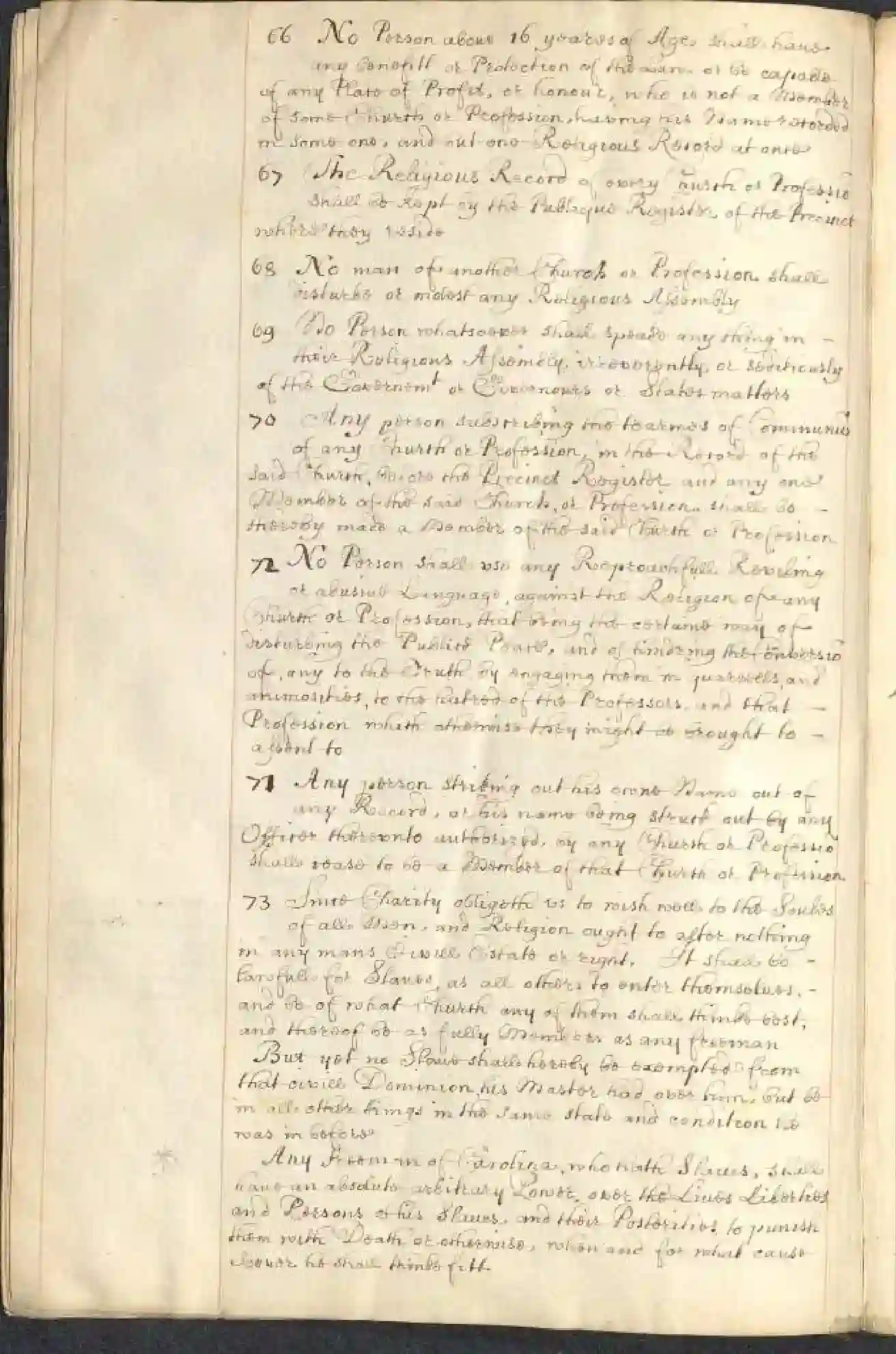
66 No Person above 16 yeares of Age shall have
any benefitt or Protection of the Law, or be capable
of any Place of Profit, or honour, who is not a Member
of some Church or Profession, having his Name recorded
in some one, and but one Religious Record at once
67 The Religious Record of every Church or Profession
shall be kept by the Publique Register of the Precinct
where they reside
68 No man of another Church or Profession shall
disturbe or molest any Religious Assembly
69 No Person whatsoever shall speake any thing in
their Religious Assembly, irreverently, or seditiously
of the Governement or Governours or States matters
70 Any person subscribing the tearmes of Communion
of any Church or Profession, in the Record of the
said Church, before the Precinct Register, and any one
Member of the said Church, or Profession, shall be
thereby made a Member of the said Church or Profession
72 No Person shall use any Reproachfull Reviling
or abusive Language, against the Religion of any
Church or Profession, that being the certaine way of
disturbing the Publick Peace, and of hindring the Conversion
of any to the Truth, by engaging them in quarrells, and
animosities, to the hatred of the Professors, and that
Profession which otherwise they might be brought to
assent to
731 Any person striking out his owne Name out of
any Record, or his name being struck out by any
Officer thereunto authorized, by any Church or Profession
shall cease to be a Member of that Church or Profession
73 Since Charity obligeth us to wish well to the Soules
of all Men, and Religion ought to alter nothing
in any mans Civill Estate or right, It shall be
lawfull for Slaves, as all others to enter themselves,
and be of what Church any of them shall thinke best,
and thereof be as fully Members as any freeman
But yet no Slave shall hereby be exempted from
that civill Dominion, his Master had over him, but be
in all other things in the same state and condition he
was in before
{*} Any freeman of Carolina, who hath Slaves, shall
have an absolute arbitrary Power, over the Lives Liberties
and Persons of his Slaves, and their Posterities, to punish
them with Death or otherwise, when and for what cause
soever he shall thinke fitt
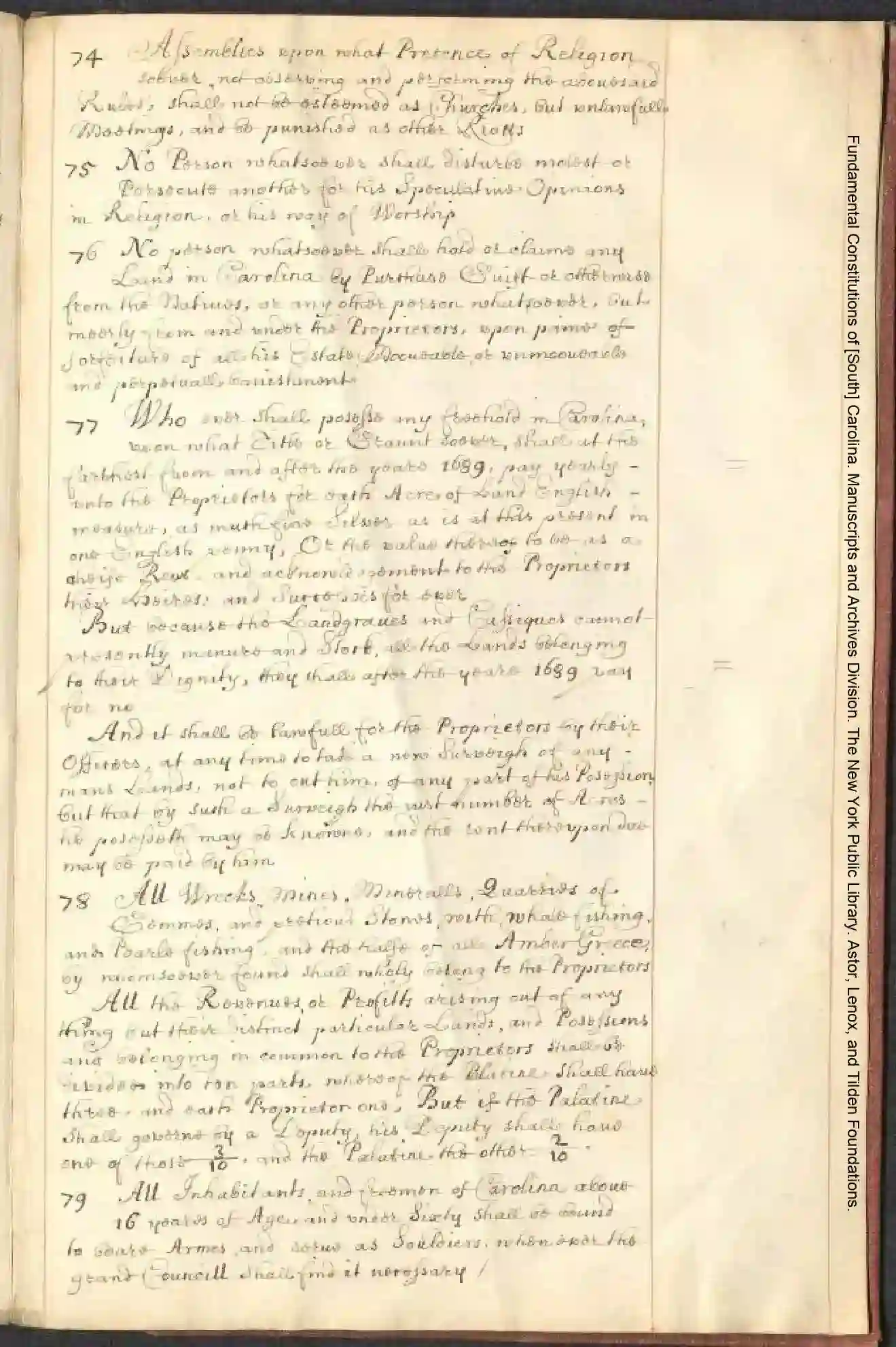
74 Assemblies upon what Pretence of Religion
soever, not observing and performing the abovesaid
Rules, shall not be esteemed as Churches, but unlawfull
Meetings, and be punished as other Riotts
75 No Person whatsoever shall disturbe molest or
Persecute another for his Speculative Opinions
in Religion, or his way of Worship
76 No person whatsoever shall hold or claime any
Land in Carolina by Purchase Guift or otherwise
from the Natives, or any other person whatsoever, but
meerly from and under the Proprietors, upon paine of
forfeiture of all his Estate, Mooveable, or unmooveable
and perpetuall banishment
77 Who ever shall posesse any freehold in Carolina,
upon what Title or Graunt soever, shall at the
farthest from and after the yeare 1689, pay yearly
unto the Proprietors for each Acre of Land English
measure, as much fine Silver, as is at this present in
one English penny, Or the value thereof to be as a
cheife Rent, and acknowledgement to the Proprietors
their heires; and Successors for ever
But because the Landgraves and Cassiques cannot
presently manure and Stock, all the Lands belonging
to their Dignity, they shall after the yeare 1689 pay
for no
And it shall be lawfull for the Proprietors by their
Officers, at any time to take a new Surveigh of any
mans Lands, not to out him, of any part of his Posession,
but that by such a Surveigh the just number of Acres
he posesseth may be knowne, and the rent thereupon due
may be paid by him
78 All Wrecks, Mines, Mineralls, Quarries of
Gemmes, and pretious Stones, with whale fishing,
and Pearle fishing, and the halfe of all Amber Greece,
by whomsoever found shall wholy belong to the Proprietors
All the Revenues, or Profitts arising out of any
thing but their distinct particular Lands, and Posessions
and belonging in common to the Proprietors shall be
divided into ten parts, whereof the Palatine shall have
three, and each Proprietor one, But if the Palatine
shall governe by a Deputy, his Deputy shall have
one of those 3/10, and the Palatine the other 2/10
79 All Inhabitants, and freemen of Carolina above
16 yeares of Age, and under Sixty shall be bound
to beare Armes, and serve as Souldiers, when ever the
grand Councill shall find it necessary /
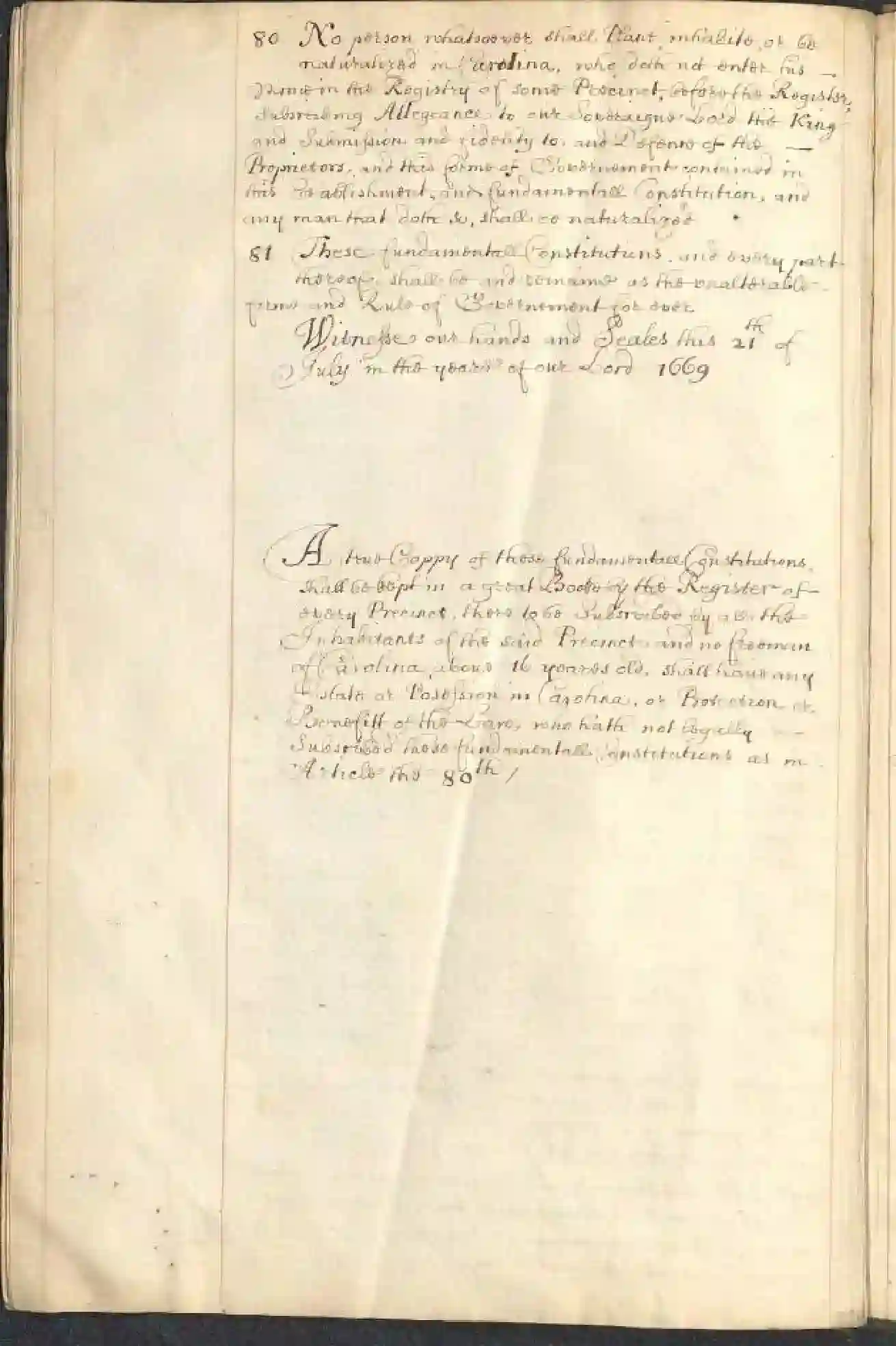
80 No person whatsoever shall Plant, inhabite, or be
naturalized in Carolina, who doth not enter his
Name in the Registry of some Precinct, before the Register,
subscribing Allegeance to our Soveraigne Lord the King
and Submission and fidelity to, and Defence of the
Proprietors, and this forme of Governement contained in
this Establishment, and fundamentall Constitution, and
any man that doth so, shall be naturalized
81 These fundamentall Constitutions, and every part
thereof, shall be and remaine as the unalterable
forme and Rule of Governement for ever
Witnesse our hands and Seales this 21th of
July in the yeare of our Lord 1669
A true Coppy of these fundamentall Constitutions,
shall be kept in a great Booke by the Register of
every Precinct, there to be Subscribed by all the
Inhabitants of the said Precinct, and no freeman
of Carolina, above 16 yeares old, shall have any
Estate or Posession in Carolina, or Protection or
Benefitt of the Law, who hath not legally
Subscribed these fundamentall Constitutions as in
Article the 80th /
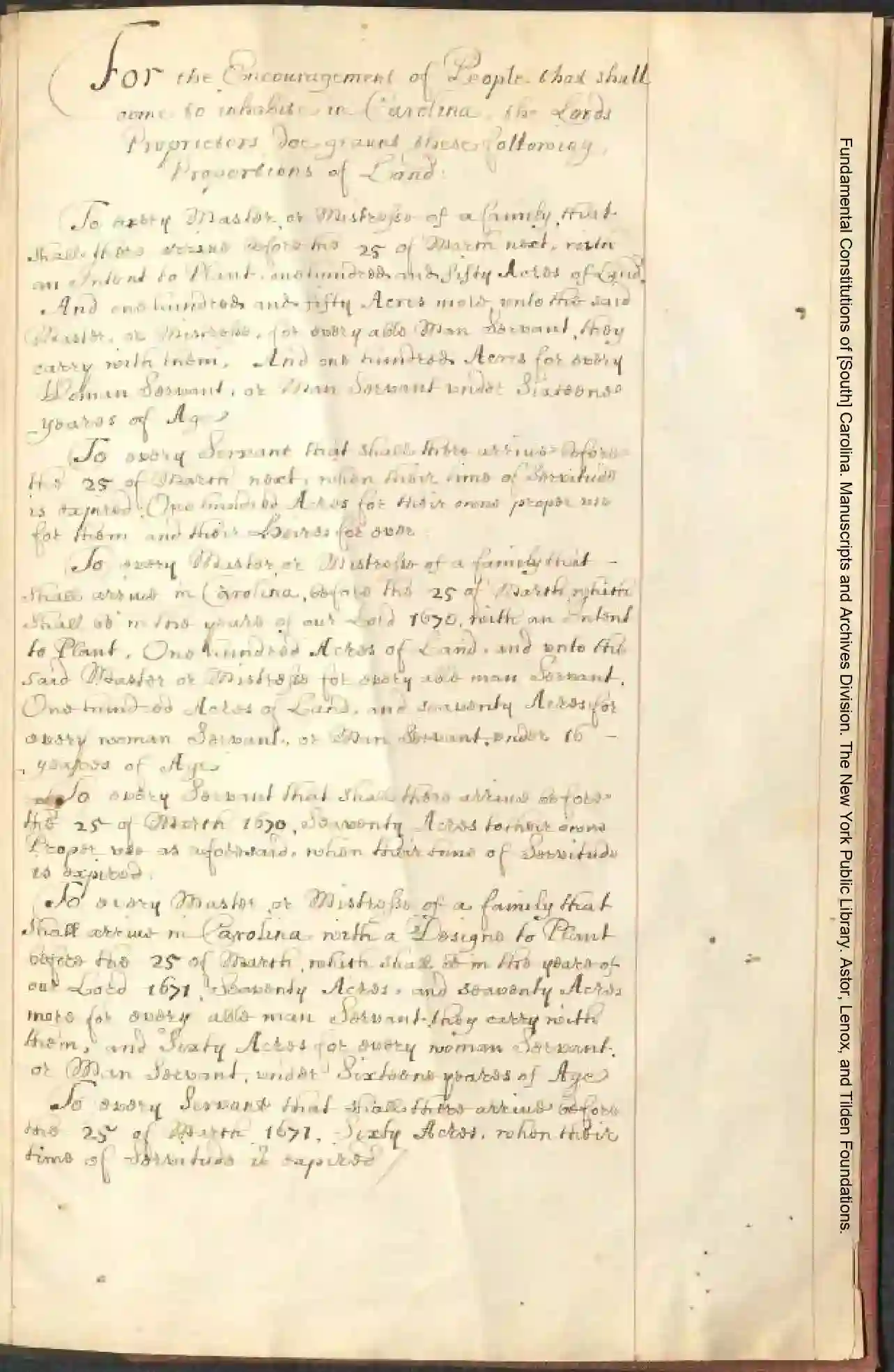
For the Encouragement of People that shall
come to inhabite in Carolina, the Lords
Proprietors doe graunt these following
Proportions of Land:
To every Master, or Mistresse of a family, that
shall there arrive before the 25 of March next, with
an Intent to Plant, one hundred and fifty Acres of Land.
And one hundred and fifty Acres more, unto the said
Master, or Mistresse, for every able Man Servant, they
carry with them, And one hundred Acres for every
Woman Servant, or Man Servant under Sixteene
yeares of Age
To every Servant that shall there arrive before
the 25 of March next, when their time of Servitude
is expired, One hundred Acres for their owne proper use
for them and their heires for ever:
To every Master, or Mistresse of a family that
shall arrive in Carolina, before the 25 of March, which
shall be in the yeare of our Lord 1670, with an Intent
to Plant, One hundred Acres of Land, and unto the
said Master or Mistresse for every able man Servant,
One hundred Acres of Land, and seaventy Acres for
every woman Servant, or Man Servant, under 16
yeares of Age
To every Servant that shall there arrive before
the 25 of March 1670, Seaventy Acres to their owne
Proper use as aforesaid, when their time of Servitude
is expired:
To every Master, or Mistresse of a family that
shall arrive in Carolina with a Designe to Plant
before the 25 of March, which shall be in the yeare of
our Lord 1671, Seaventy Acres, and seaventy Acres
more for every able man Servant they carry with
them, and Sixty Acres for every woman Servant,
or Man Servant, under Sixteene yeares of Age
To every Servant that shall there arrive before
the 25 of March 1671, Sixty Acres, when their
time of Servitude is expired /
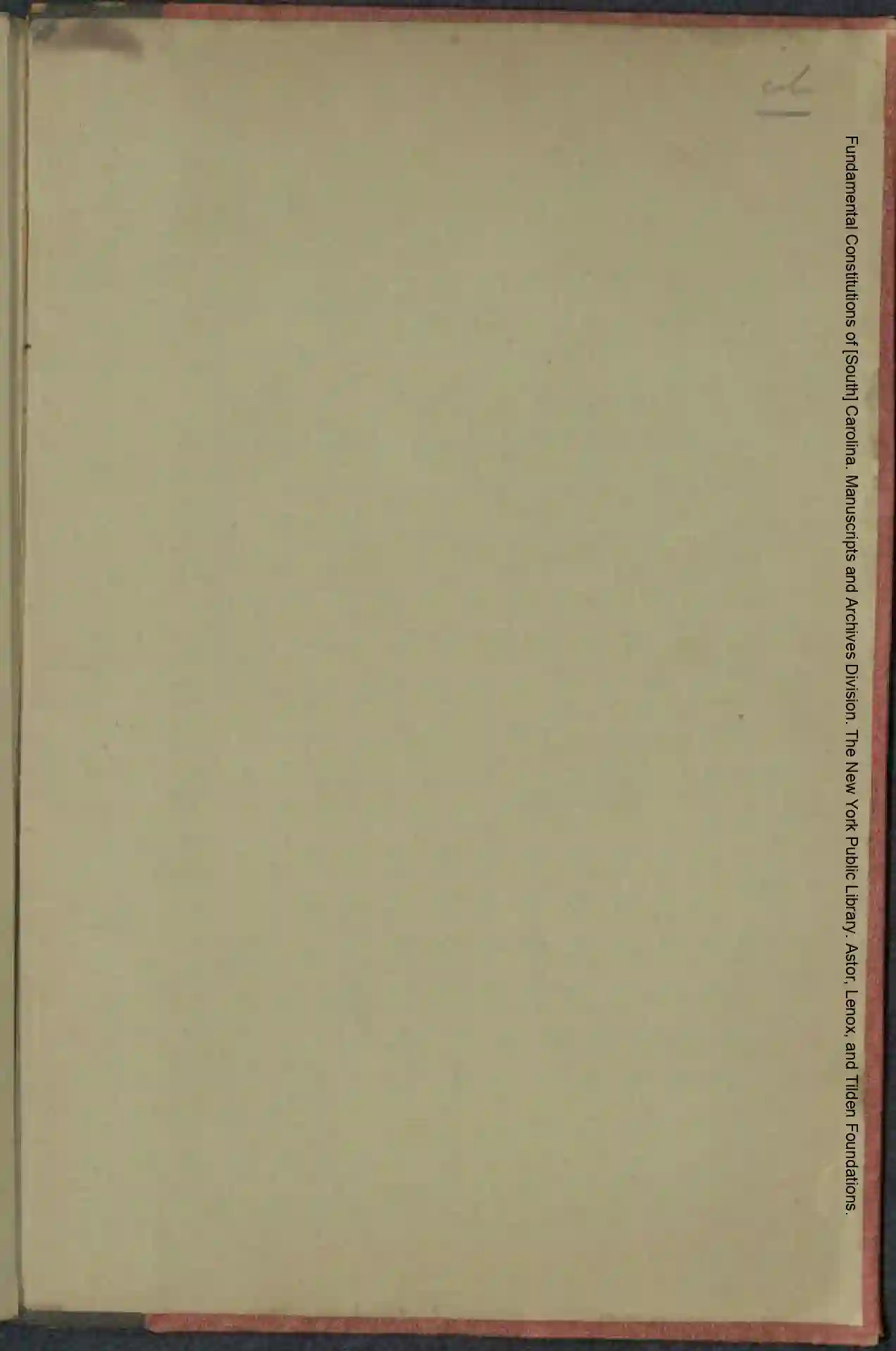
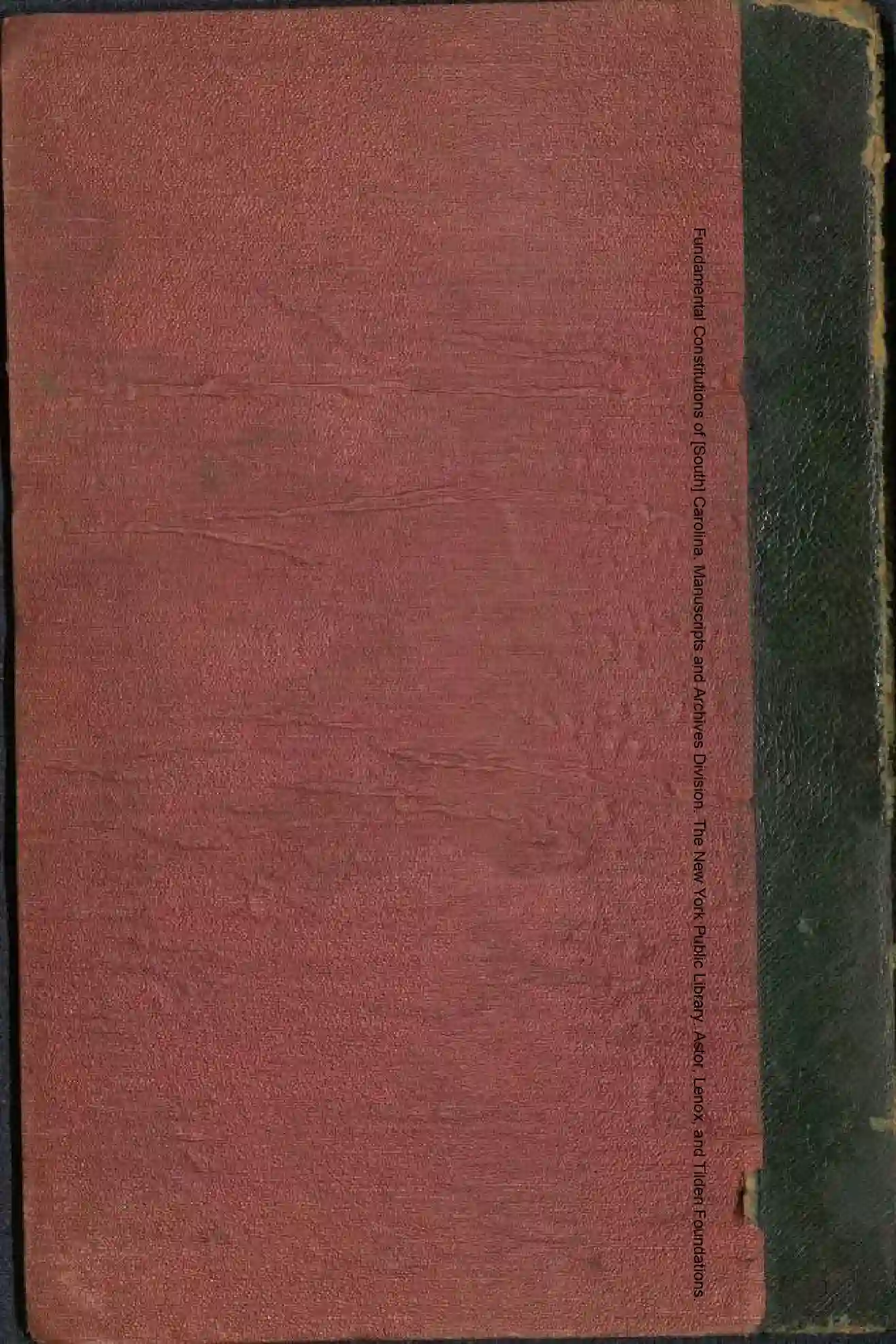
Footnotes
- *Without which no agreement or Assembly of men upon Pretence of Religion, shall be accounted a Church or Profession within these Rules